This is Rik's Place
Return trip to Pakistan
Introduction
It all began in 1974, when I was on a round the world trip using two Landrovers we had built up, with three mates of mine.
During a difficult time in Peshawar in Pakistan, Dave and I decided to got for a run (a thrutch, as it was called then),
and try to reach the legendary Hunza Valley in northern Pakistan, leaving our two travel mates in Peshawar. Dave and I has
some adventures as we ran up the Kaghan valley heading for Babusar Pass, which would allow up to drop into the area of the
Hindu Kush mountains, of which Nanga Parbat and K2 are the most famous.
We were late leaving and we didn't know that as winter approached, many of the old wooden bridges would be half dismantled
to stop people using them and getting too far north. We soon discovered this. We met our first partially dismantled bridge,
but managed to get over it. We met a second, and had to ford the river it crossed, but when we met the third bridge, it stumped
us. At an altitude of 10,000 feet we tried to build a pathway for our Landrover so we could reach the river and ford it as
we had done previously. We quickly exhausted ourselves, and abandonned the attempt. We named this "The Bridge that Stopped Us",
which I subsequently called "THE Bridge".
On the right is THE Bridge. This image is from Dave's blog about the original trip.
You can see it at this link
Below is where the landrover got to in the boulder field, the bridge is in the background.


The idea of returning and completing the run to Gilgit dogged us.
I promised Dave I would do it. I made four half-hearted
attempts, and one other serious attempt. That last one was abandoned a week before it was due to start when Osama bin Laden
was killed, in Abbattobad. That town was on the route I needed to take, to get the the Kaghan Valley, and I knew the military
would have sealed it off, and made my journey impossible.
To the Bridge
And so to the completion of the story. On 4 August 2013, two days before my sixty-second birthday, I arrived in Islamabad,
in the heat of August in the middle of Ramadan (that fact was to haunt me later). "A", my friend and guide was there
to greet me, having driven for 20 hours down from Gilgit in the mountains.
It puts a whole new perspective on the phrase "I'll pick you up from the airport". We headed to his hotel, to discuss
our plans. After some preparations, we set off the next morning at 04:30. Our driver ("M") and his car were late arriving,
as we had risen at 03:30 ready to meet him at 04:00, but then this IS Pakistan, what did I expect? His Toyota Corolla
with leather seats and wood panelling, reflected the Pakistani penchance for motor excesses. The blazing local music from
his MP3 player was silenced by my need to use his cigarette lighter socket to charge my laptop, and I was eternally
grateful for letting my battery go flat. In that lappy, were the instructions and pictures that would guide my quest.
During our original trip Dave had kept his log (little knowing he was actually writing what was to become a blog),
which is loaded on the web, and to which I have turned for the detailed plans which were to lead me. I had used good
recent maps, and even Google Earth to get the location, with no luck. I found out why later.

So, where are we in the world?.
On the left is Pakistan, bordered on the west by Afghanistan and Iran, the North by China, East by India, and South
by the Indian Ocean.
Below is a closer view of northern Pakistan, and you can see Skardu in the top right.
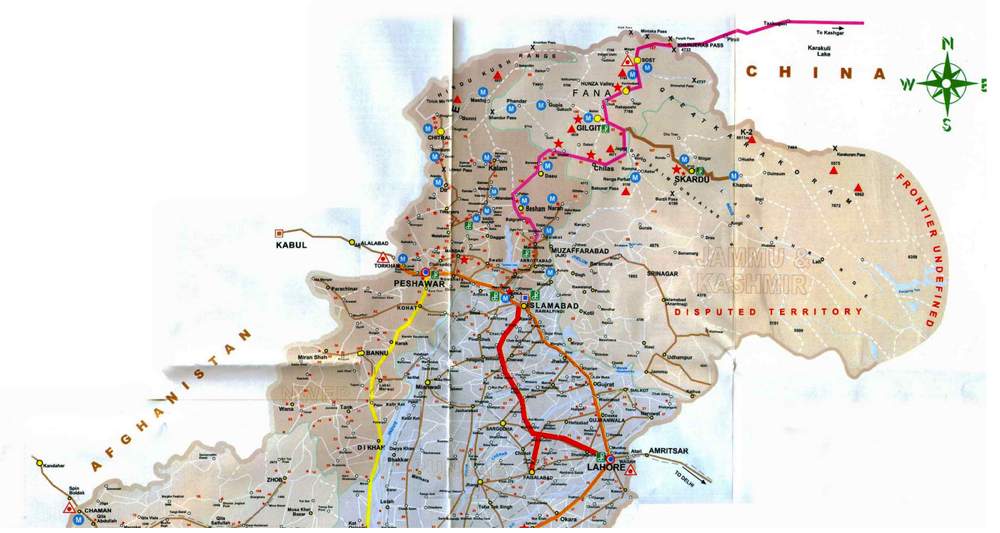
Here we have a closeup of the area we will be travelling.
Going north up the N15 (Kaghan Valley), through Naran, find THE Bridge, cross the Babusar Pass, join N35 (KKH, Karakorum Highway)
just east of Chilas, and loop round to Gilgit.
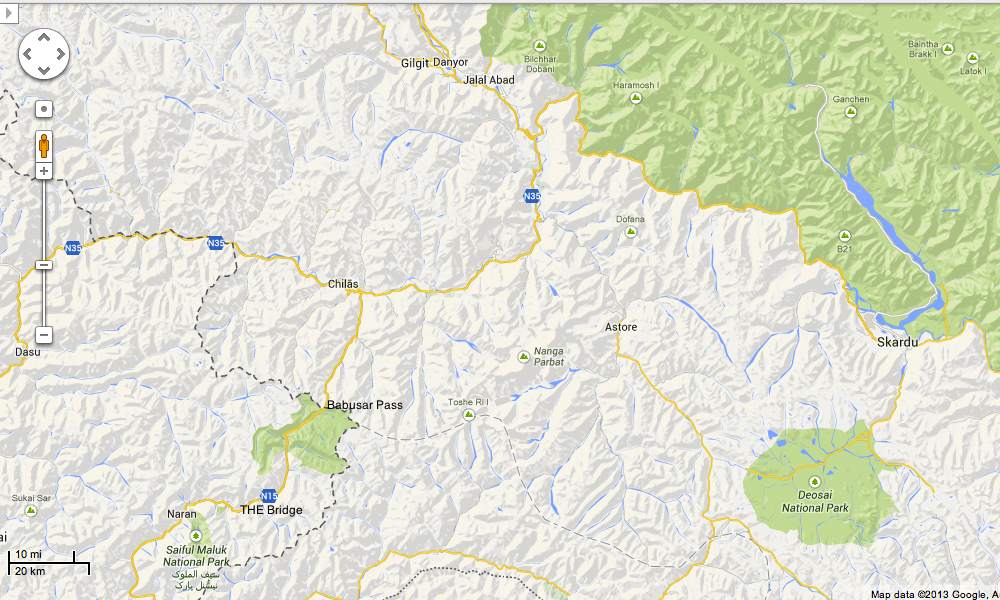
So we set off amid the quietest eastern country I have ever seen. No people, no traffic, no bussle and no noise, oh
thankyou Ramazan. We soon found ourselves on the new motorway which spans the country from Peshawar via Islamabad
(well Rawalapindi actually) to Lahore. In 1974 I had taken the bus from Peshawar to Lahore to get some Landrover parts,
and it was a three day round trip (that was in Ramazan too as I remember, note Ramazan, "Ramadan" to some countries,
changes its date each year by 10 days).
The "motorway" in Pakistan is such by name only. True it is a toll road, and it allows for traffic at 100km/h, but
we still had to swerve dogs, livestock and horsecarts coming the wrong way.
We drove west for a while until the turnoff to the right (N35 Kakakorum Highway, KKH) which headed north towards our goal.
After a couple of hours driving in which we made good time because the roads were deserted, we arrived at Abbattobad,
and as we drove past the military compound I mentioned to "A" that is was infamous all over the world. His reaction was
one I was to hear several times later, challenging the USA's right to such a mission, and whether or not it even was
bin Laden. I saw recently an article in "Dawn" (an online Pakistani newspaper) that the US had released "proof" that
they had tested DNA from the scene that proved it was bin Laden. One wonders where they got the sample from to make the
comparison. Many people in Pakistan still do not believe it really was him.
We headed north east (up the N15), through Naran, and arrived at Burawai. It is now a thriving town, very different to the
settlement Dave and I saw. Every village we passed through had a sign showing how much of the international donations had
been spent there. After the 2005 earthquake that killed 80,000 people and made 3,000,000 homeless the whole area was
decimated, with no houses and no roads. Mind you the only real evidence of the money was the new road, and many, many new
houses built by local dignitaries. The new road was built in a hurry, with no real planning. They just cut into the
mountain to make it wider, they even painted a white line down the middle, a waste of time for the drivers in Pakistan.
The result is that now every time there is a decent rain, there are landslides which cut the road, and there are teams
of Chinese workers sent to clear it. While I was there, landslides became a real issue.
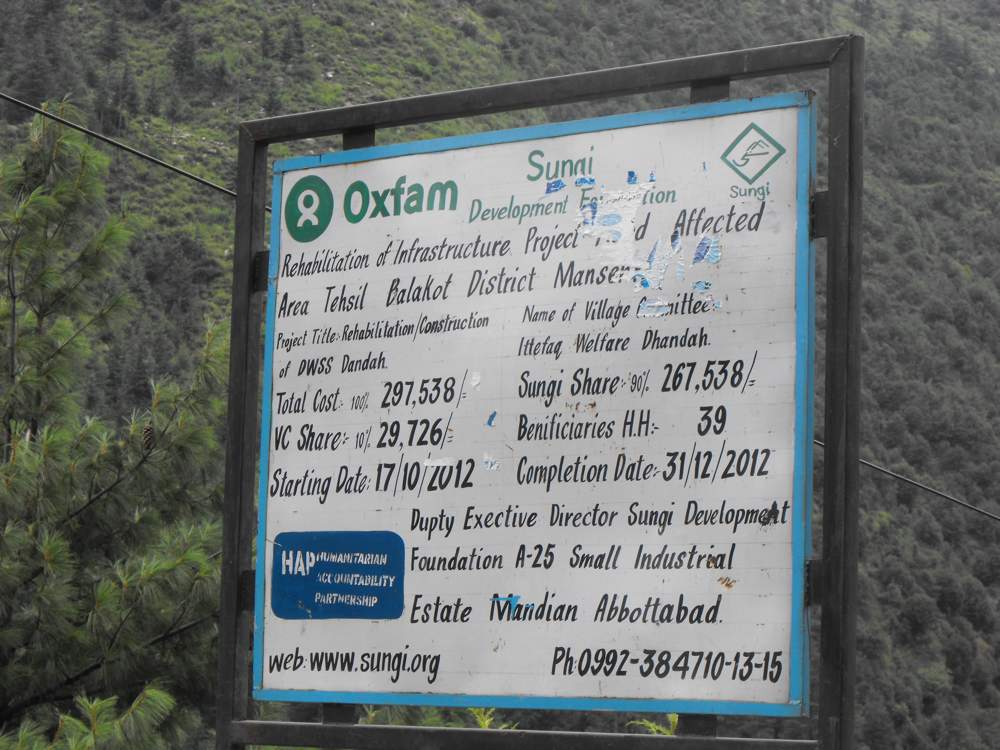
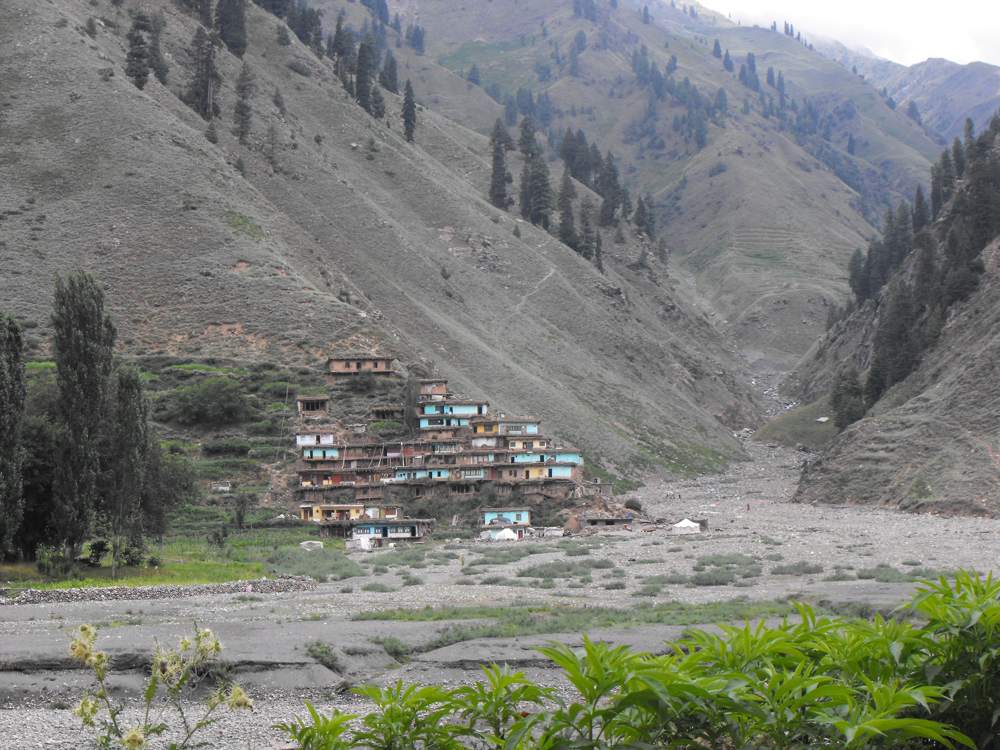
The road up the Kaghan Valley starts to show how beautiful Pakistan can be.

I started to see what I believed was some of the old tracks Dave and I had driven up, before the new road was made.
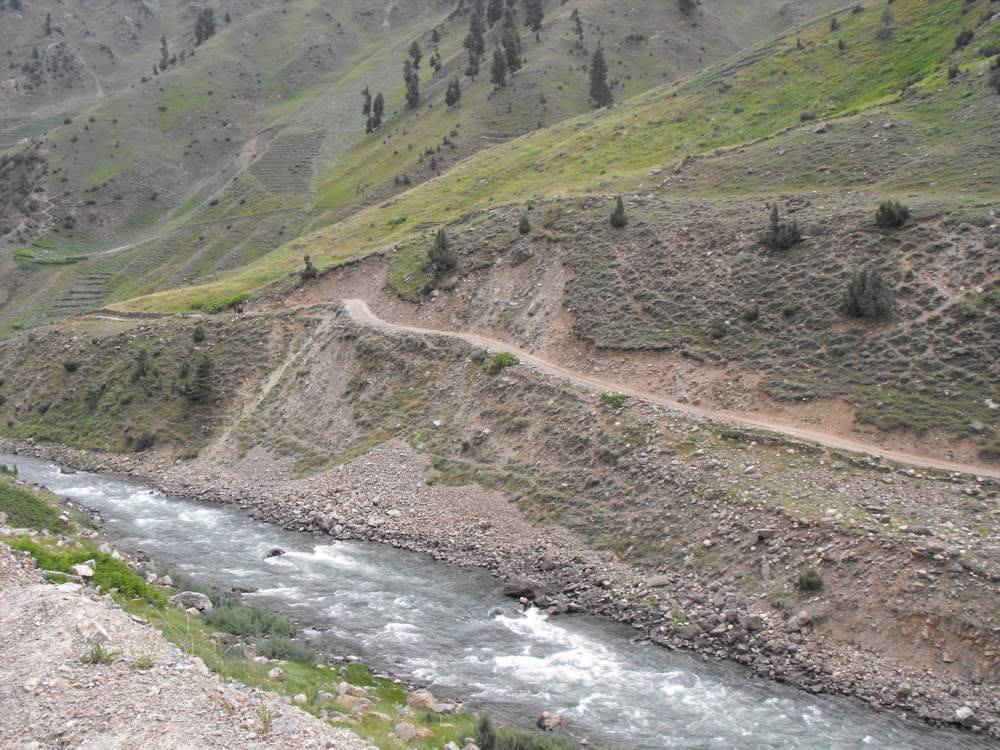
The new road has definitely made life easier for the locals, and encouraged bee keeping which was ubiquitous.
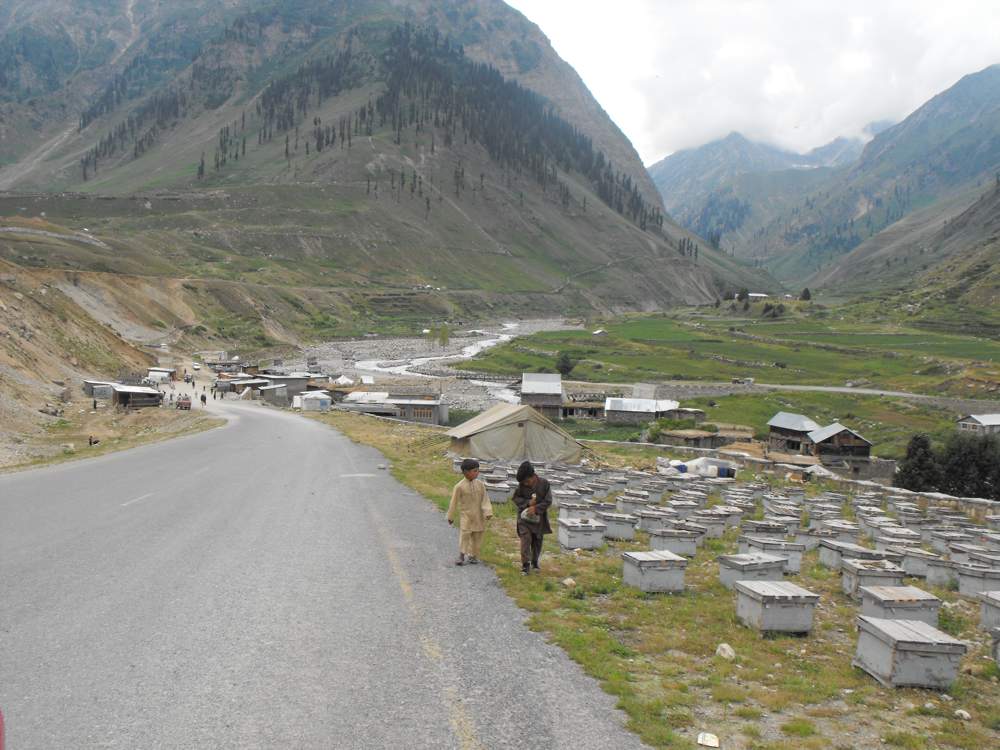
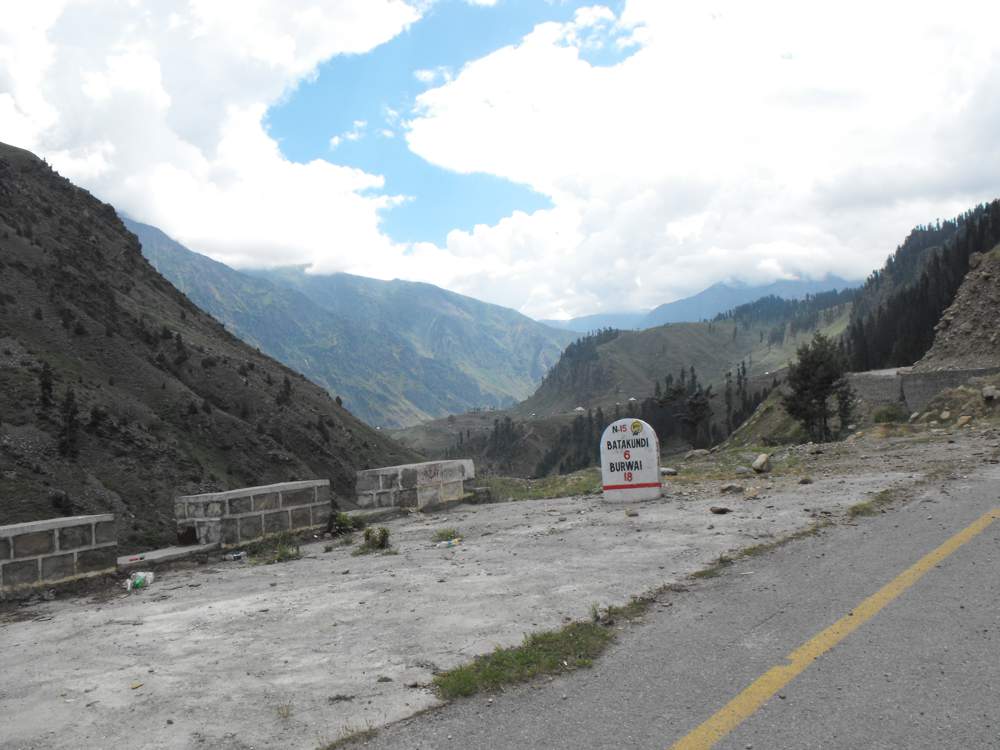
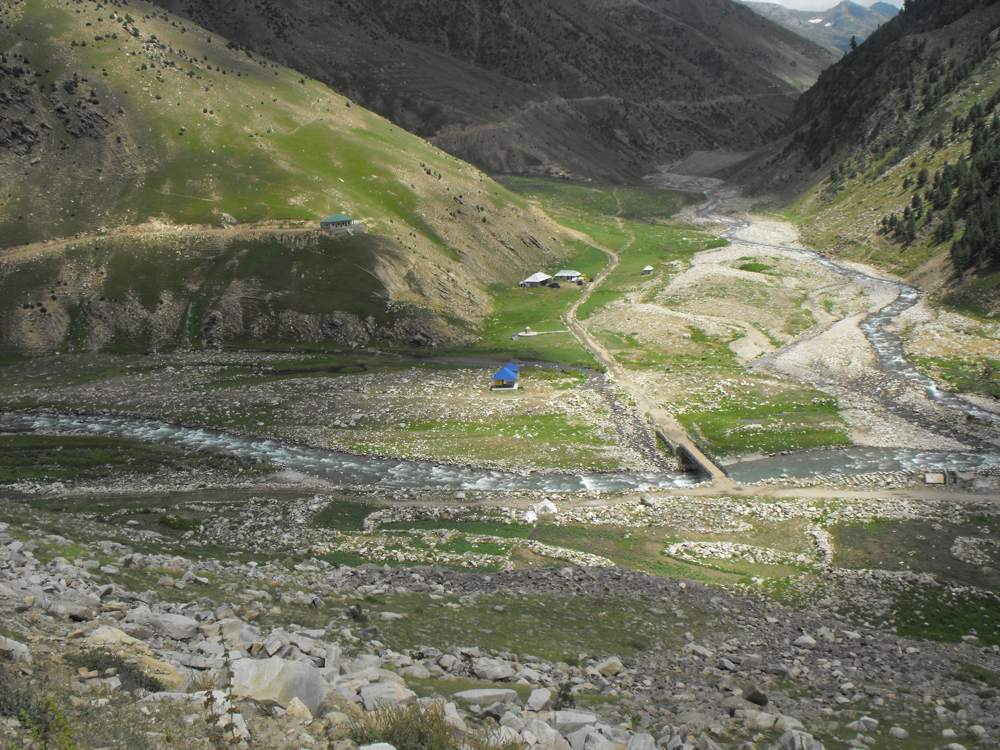
I expected it would be difficult to find THE Bridge. Dave's log showed the distances from Burawai, and as we neared I
started to measure the car's odometer. We stopped when the distance was right. Nothing looked the same as I remembered.
We drove around for a while, stopping whenever it seemed right. We talked to many locals, and showed them the pictures.
None could help, until one old guy recognised the brickwork on the bridge photo, and gave us directions. The new road
started to rise up and away from the river we were following, and headed around a steep incline. As we looked down we
saw the old road, and it appeared to cross the river. We backtracked, and followed the old road, and there it was. The
old wooden bridge was gone, and a newer iron structure was in it's place. The old man had said it was about 20 years old.
It had survived the earthquake, being metal. We had found it.
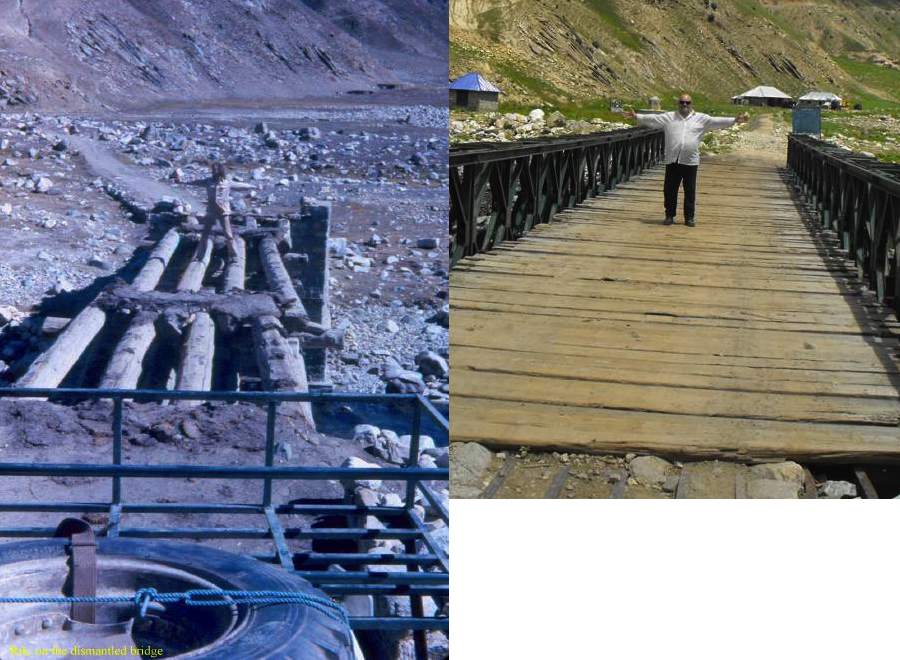
"A" pointed out that the markings on the hills behind the bridge were the same as the photo. The river course had changed
a little, and the boulder field was very different. This apparently was due to the severe flood that moved things, and the
locals reworking the area, but it was the same place.
The new bridge was bigger and wider, and so is the Rik.
So, I had succeeded in my mission, and it was still only 11am. It was almost an anticlimax. We could now head up the new
road to Babusar Pass, about an hour's drive away, and a four hour drive would see us in Gilgit for dinner.
Wow, was I in for a surprise.

We drive north and I have to remind myself to keep taking photos, because it is all so beautiful, you can forget.
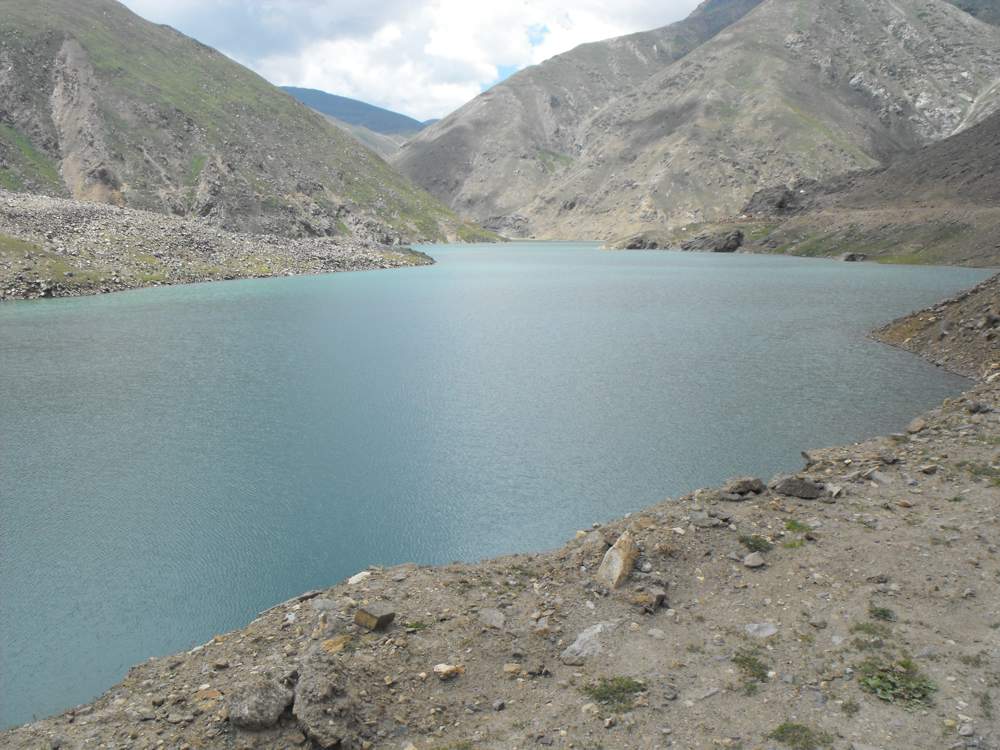
Along the way we pass Lake Lulusar.
To Chilas, Down the Mountain
We drove on for a while, then "A" pointed to two bumps in the mountains saying that the pass was between them.
A short time later, "M" stopped the car, and went to talk to a group of about eight men sitting in a circle in a field.
We could not hear what was said, but much arm waving, pointing to me, and the sound of angry voices silenced "M".
He returned and talked to "A". "M" did not speak English, so I waited patiently as they talked. "A" said nothing to me,
so I had to ask what was happening. He said "Babusar no good". When I asked why, he was unclear. "Not allowed".
Pakistan struggles to be a united country because it is really a group of tribes and sects, not all of which get on together.
This trip I was a lot more observant, and watched closely to see if I could determine to which group a person I met was a part.
Colour of skin, style of clothing, style of head gear and beard cuts were my guide. Most Pakistanis are Muslim, and are kind
and generous as they follow the true faith and the teachings of the Qu'ran. I was to see this in practise many many times.
However there is one group which are Pushtun. This group make up the hardcore Taliban, they all look similar, and when they
look at you their eyes are unwavering, intense and they never smile they just stare. I soon learned that the only way to get
any respect, is to stare intensely back at them. But really they showed no real respect, even to other Pakistanis. I watched
as both "A" and "M" deferred to them, and never said much to them at all, whereas to all other groups they chatted long and loud.
Two weeks before I arrived in Pakistan there was a major jailbreak in the NW, where over 200 inmates were freed by the Taliban.
One could only guess where those escapees were now, and we were only 100km away, so we were very cautious around all Pushtuns.
As we drove away, I looked back to see the group of eight Pushtun men watching us intently. Again I asked what was
happening, "not allowed", "Babusar closed". Yet we were still heading towards it?? Then we came to a track and turned
left onto it, heading away from the Babusar road. I asked, are we going back to Abbattobad? If we could not traverse
Babusar, we would have to retrace our steps, which would be a 20 hour drive the long way round to get to Gilgit.
"No, another way" said "A", "we can go to Chilas". My heart sank. Going over Babusar we would get to KKH, and we would
join it several kilometres east of Chilas, and thus avoid it. When I was planning this trip, I learned that Chilas was to
be avoided. In 1974 when we were in Peshawar it was like a wild west frontier town, where everybody wore bullet belts and
carried a gun. But it was a tourist "hippy" thoroughfare to India, and tourists were tolerated for their spending. Now that
Afghanistan is closed, Peshawar is a remote town, and populated mostly by Pushtun. Chilas is now the same. It is a Pushtun
town, and even Pakistanis who travel from Gilgit south, try to avoid stopping there. The "Dawn" newspaper had had many
articles about violent events there. So I was very nervous about going there.
"A" had never traveled the road we were now on, and "M" claimed he had, which turned out to be a fib. I asked how long
it would take to get to Chilas, hoping we could just go straight through. No one answered me. I asked more about the road,
and "A" told me we would now have to traverse the Botoga Pass, which was at 14,000 feet, one thousand feet more than Babusar.
It was about 2pm, and I thought it would only take a few hours to cross, as my GPS showed we were at 12,000 already.
For a while we drove along easily, with "M" constantly looking down into the valleys. When I asked "A" why, the reply
was that he was trying to see girls. I realised we had not seen a woman since we left Islamabad. The world will remember
the treatment women received under the brief Taliban rule, and it seems in these remote places all that, is still in effect.
The men do all the shopping in the bazaars, and women are rarely seen out, even wearing a burka. So, "A" had seen few women
in his 25 years of life. I felt deeply sorry for him, and all young males there. Most marriages are arranged, with the
groom meeting his wife only at the wedding. Islam teaches that women are equal to men, and are to openly share their lives.
This treatment is NOT Islam, it is just male Taliban extremism. "A" is happily married and has seven children, but is
concerned what will happen as his daughters reach marrying age, 14yo.
We continued along until my heart sank again. As we turned a hairpin, the road seemed blocked. A large trailer had been
abandoned as it was completely stuck. These large trailers would normally be pulled by a tractor, and this one was severely
stuck blocking the track. We stopped, and much to my surprise they got out and started to prepare the side, moving boulders
by hand. "A" then slowly drove the car past the trailer. It was very steep there, and I expected it to get stuck. Well it did.
So after a while of pushing, bouncing, reversing and trying, we got it through. I remember thinking, I hope we don't have to
come back, as we will not get past again.
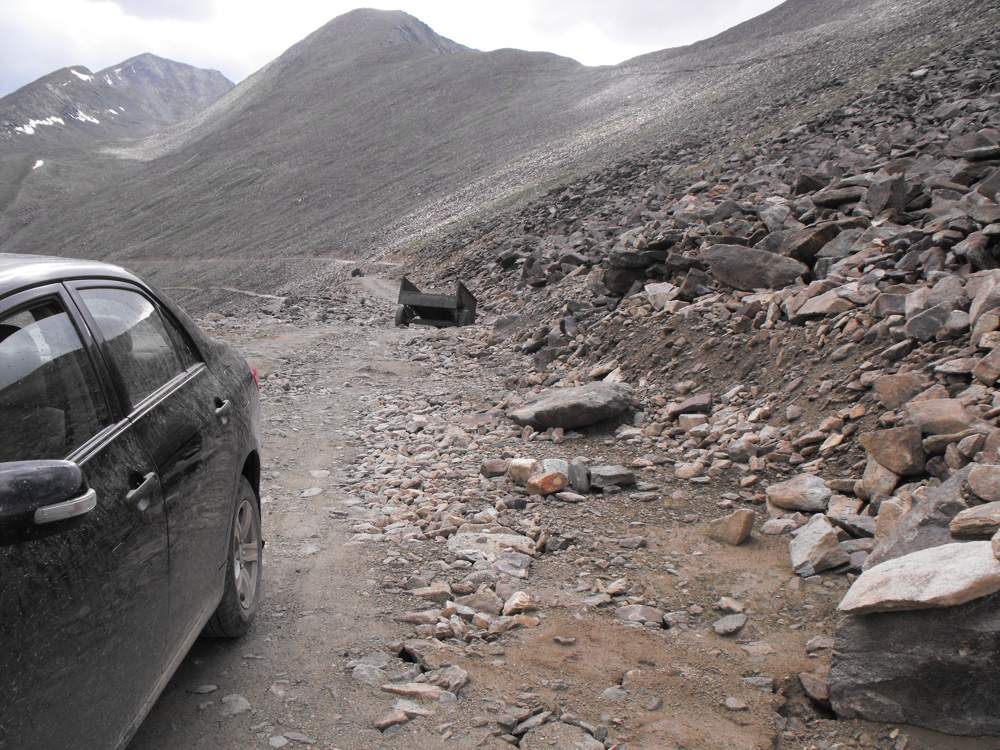
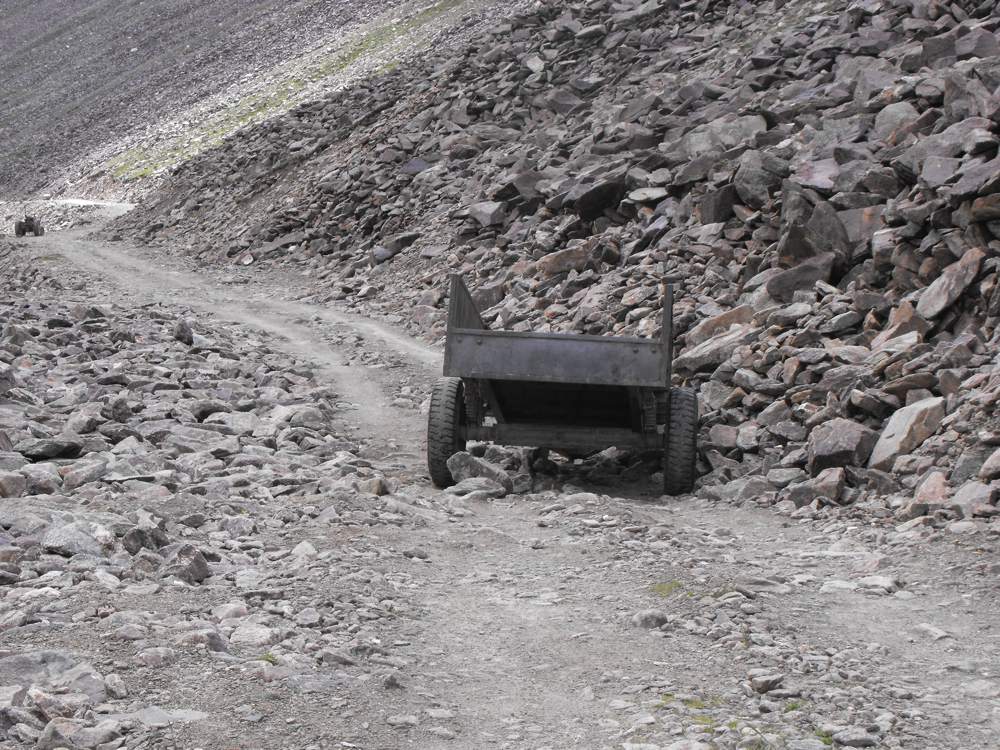
A while later "A" advised me we were at the Botoga Pass. We stopped for my obligatory photos, and GPS reading, and I
marvelled as we looked down on snow capped mountains in the distance, but below us. We were at 14,184 feet, and some
30km from the turnoff. Well, I could see the track snaking round the mountain, and it was descending, and my spirits
lifted, we can't be too far away now. Oh Rik, when will you learn?
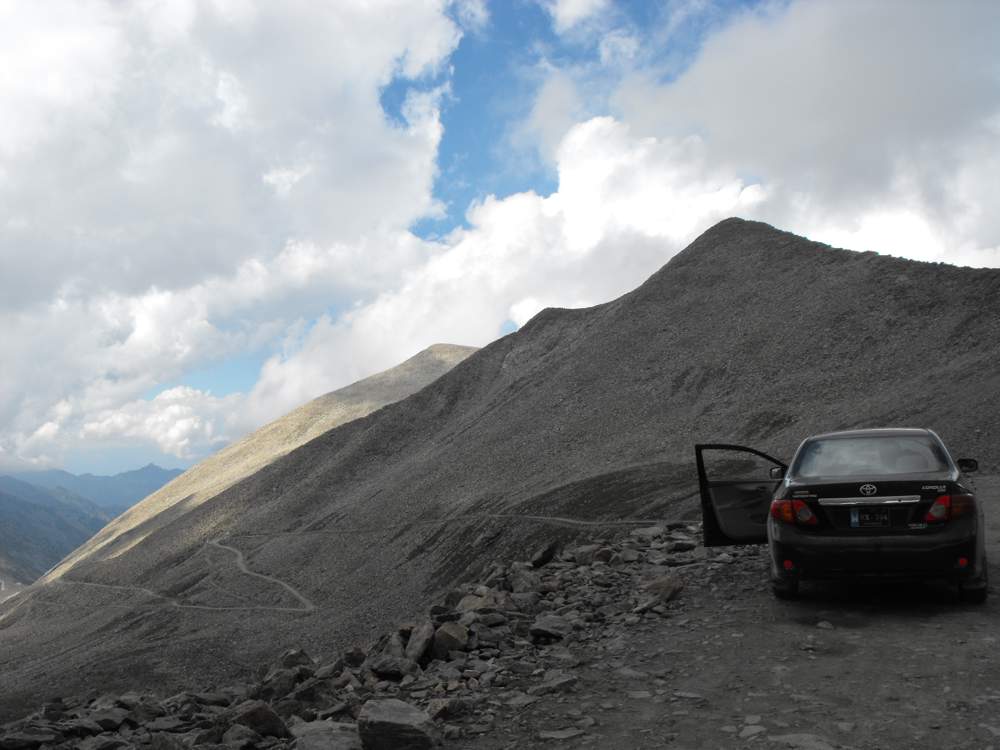
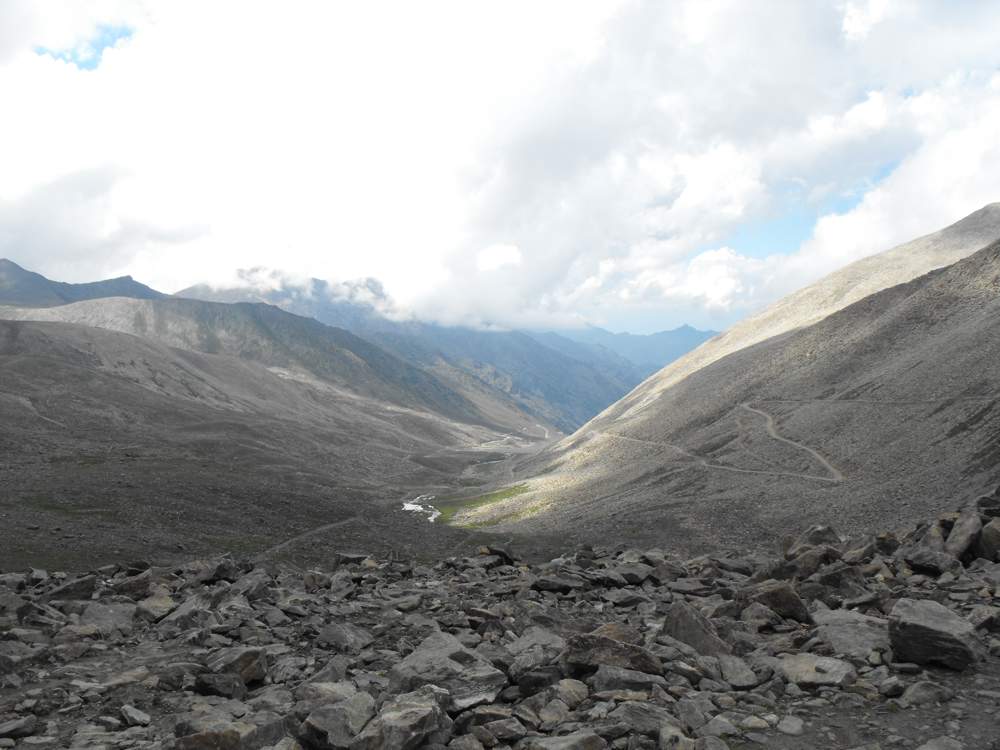
The view from the pass makes you realise why these parts are called "The Roof of the Earth".
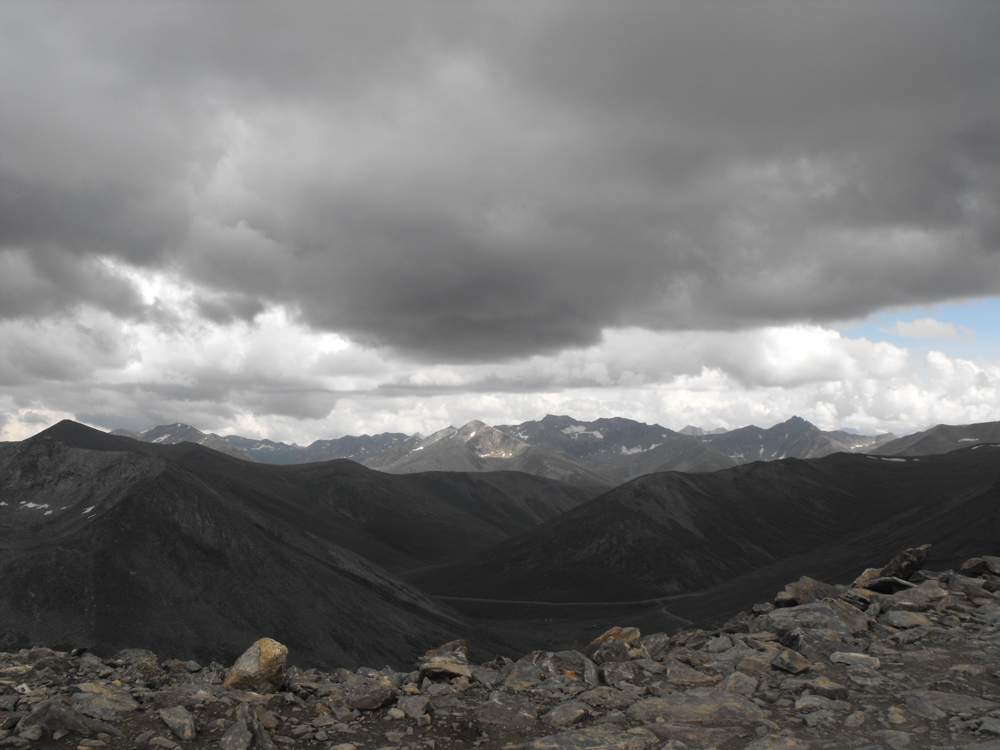
We drove on for a while, and we saw two men at a hairpin, and they flagged us down, I guessed asking for a lift.
What were they doing here so far from anything, and on foot? Well "M" didn't slow, and ignored them as we passed by.
I said "Pushtun?" and "A" nodded. Well we were driving a steep track that snaked back and forth, dropping gently between
each hairpin. The two men were walking/scrambling directly down the mountain, and they would reach each hairpin, just as
we did. In fact sometimes they were faster than we were to the next hairpin. They waved each time we passed them, and
became angrier and angrier as "M" ignored them.
After a while we lost sight of them. Then we rolled to a halt. "M" cranked the motor, but it would not start. "A" and "M"
had a heated discussion in Urdu, but I heard the word petrol. I leaned over to see the instruments, and the fuel gauge
was showing empty, and a small red light under it was on. I was amazed, how could you set off on a trip like this and not
fill up? "M" claimed the fuel gauge didn't work, he tends to fib a bit, this one. So we sat there 13,000 feet up, and
over 30km from a road.
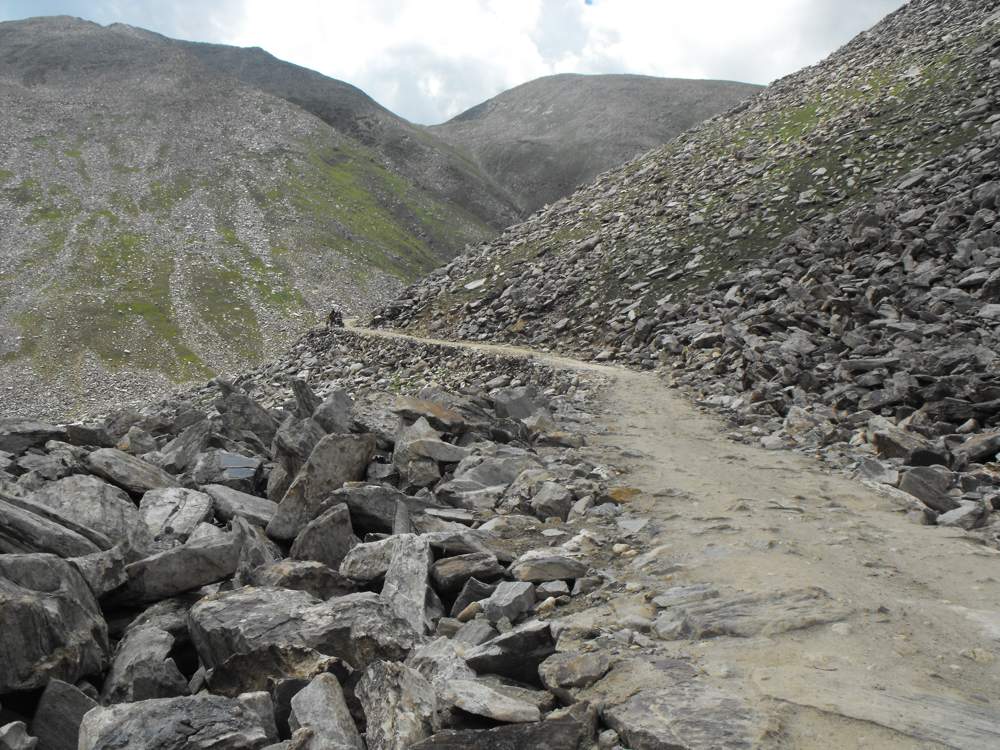
There are no photos for a while, as is explained in the text.
Well surprise, surprise as a truck came down the mountain and stopped. Much chatting and laughing. Then the two men
appeared, and shouted at the truck driver. I said to "A", are they telling the truck not to help us? He said yes. The
two men left still shouting, what I guessed to be local insults. Just then two motorbikes came up the mountain and
stopped, each bike had two men (nothing new here, I had seen many bikes with three people on. Much chatting and laughing.
They then grabbed my water bottle, emptied my last water out and cut the top off. They visited each bike and disconnecting
the petrol feed, and drained petrol into the bottle, and got about a litter. I said to "A" that surely they must not put
bike fuel into the car. But it turns out the bikes in Pakistan are not two stroke, and they use the same fuel as cars.
Our car started to much cheering, the bikes continued up the mountain, and we pulled in front of the truck, and drove on.
As I looked at the horizon, all I saw was more and more mountains, and I didn't say anything but surely one litter would at
most get us 10km or so?
Well we drove on, and soon enough the car stopped again.
We sat silently. I expected the truck to arrive soon, but it never did. I had seen no turnoffs, so where was it. After about
40 mins, I turned to "A" and said OK, lets roll down. They both said it couldn't be done, as with no engine, there were no
brakes. But I insisted. They refused. So, I got in the driver's seat, and let the car roll, then I slammed on the brakes and
skidded the car in the dirt. I explained it would work. Steering would be heavy, and brakes poor, but we could do it. "A" got
in and tried, but nearly drove off the road, and it was about 1,000 feet to the valley floor here. He got out and demanded I
do it. So, I got back in, and started to roll down the mountain.
The hairpins were the worst, as you had to slow down, but you wanted to keep the momentum up, so it took a lot of concentration.
We continued like this until came to a house by the road. A man and his nine children lived there. Did he have any fuel, no
sorry his can was diesel. Mind you, I was amazed at where they lived. Apparently it was subsistence living, with the father
working on clearing landslides for the road department for small pay. We rolled onward for another 5 km. Then we came to
another house, and a road barrier. I stopped of course, expecting someone to ask to see my passport. The man arrived, and
yes he was the police, but keep your passport.
All his kids poured out to see me, and stood in a line staring at me blank faced. The man said "what country you, America?'.
I said Australia, and he smiled, "Ah Gilchrist, Warne". I laughed too and said Imran Khan…the cricket connection broke the
ice again. I did a cover drive with my invisible bat, and all the kids laughed. "A" and "M" went off with the man, and I
played with the kids, having not a word in common. With much arm waving, and funny faces I soon had them all laughing. I
singled one small kid out, and chased him until he hid behind a bigger brother laughing his head off. They have fantastically
white teeth, and eyes that twinkle, living a life of total poverty. The man was not really police, he just opened the barrier
to traffic. I never did discover why there was a barrier there in the middle of nowhere. The adults returned brandishing a
10L can, and poured the petrol into our car, and for the first time I saw money change hands. With much hand shaking and
laughing I grabbed my camera for a group shot, the man shouted "ne, ne" and when I turned round the kids were gone, and
turned back and he was gone. "A" explained they could get into trouble even talking to me, and they could no afford to be
found out.
Well we drove on, and soon enough the car stopped again.
I looked at the fuel gauge, and it showed just above empty, now there WAS fuel. "M" sat there just running the starter,
then gave up, and we sat there. They got out for a smoke, and I got into the driver's seat, and said get in, and off we
rolled again. It was nearly 5pm, and still 12,000 feet.
As we rolled on, the main problem was when the road pitched up a bit, and we would slow down. Sometimes we continued on,
and sometimes they got out to push. And on we rolled. An hour passed like this, and I heard engines. From behind us came two
motorbikes, with four guys. We stopped. Much chatting and laughing. I heard "Australia" a couple of times, and "A" swerving
an imaginary steering wheel. They all laughed. I said Imran Khan again. "Imran Khan 26, Australia 4", and made a miserable
face, showing how much Pakistan had beaten Australia at cricket in those days. They all slapped me on the back, as they
listened to "A" tell his story. And "M" kept churning the starter.
In the mountains the time can be deceptive, as it darkens early due to the sun setting behind the mountains. I was getting
concerned, and wanted to keep moving. But it seems that "A" was telling about the car, and now the bonnet was up, two were
under the car, and they were all shouting, getting in each others way, and generally trying to fix it. They poured petrol
down the air filter and the car ran well for 10 seconds. In about half an hour the light failed completely, and it was
nearly dark. And instead of continuing to work with some urgency, they all together downed tools, walked over to a flat
spot and crouched down (as they do) in a circle. They lay a small rug in the middle, and gestured for me to join them.
As I arrived, they had laid a small bunch of grapes, and to apples on the rug. Ah, realises Rik it is Ramazan and the sun
has set. During the holy month of Ramazan (Ramadan to everywhere else except Pakistan and Turkey), one must fast all the
daylight hours. They must not in fact even drink water. I had been drinking water all day, just proving that I am an infidel,
but the normal Muslims do not object. Drinking water in public would get me into trouble later. They were now going to break
their fast. So two apples and 30 grapes, and with me there were seven of us. And they shared with me, the infidel, their
meagre feast with generosity. It was humbling, so after a piece of apple and few grapes, I declined all further offerings,
and they smiled among themselves when I did. At the end they gave me the last piece of apple, which I accepted saying "Shukriya",
which is Urdu for thankyou, which earned me more back slaps.
By now it was pitch dark. While they ended their repast sharing cigarettes, I wondered off. One of them ran after me and
grabbed my arm, as he thought I was perilously close to the edge…it was so easy to forget where we were. I sat and looked up,
and for a moment I could not see the usual northern hemisphere constellations, as all the stars we so bright. One of them
joined me laying on our backs looking up, and I pointed to the constellations, naming those I could remember, but I am sure
he didn't understand a word I said.
Then dinner was over, and out came all the mobile phones, which they were now using as torches, and the buzz around the car
resumed. "M" kept running the starter, and even had the headlights on for a while. Another complete bottle of my water was
emptied, and they attempted to cut a hole in the cap and push one end of a hose into it, and the other into the air filter.
They filled it with petrol…but it leaked too much, so that idea was abandoned.
Suddenly everything was being packed up, "A" said get in, and off we rolled. On bike led the way, the other bike followed.
"M" took rolling duties, and turned the headlights on. We continued like this for another hour, when we cam to a rise and
rolled to a stop. They all ran round the back to push, I started to get out, and they all shouted at me. So with "M" and I
in the front, they pushed the car up the rise, and when we were on a slope again, collected the bikes and resumed the roll.
After a while "M" asked "A" to drive, as he was tired. It was around 9pm and he had been driving since 4am. So "A" took over.
He is a much better driver, and it helped my nerves. It was still scary, as we were always only a meter or so from a 1,000
foot drop to the valley. We continued like this, but at each rise when we stopped, the five pushers found it increasingly
difficult. So, now each time we stopped I too jumped out. As I told "A", even if I don't push, my weight is 100kg less for
them to push.
Then as we were rolling down a reasonable slope, one of the bikes pulled in front of us waving to stop. We did and got out,
we had a flat. Rear right tyre was flat, "A" had not noticed as the track was so rough. I was glad it wasn't a front blowout,
as we may have been launched over the edge.
So, now we dig out the spare, and lo, it too is flat. I am liking this taxi driver "M" less and less, very poor preparation.
It is 11pm and as it is summer it is still quite warm, so I thought that if we have to stay here until morning while the bikes
go for help, I may actually get some sleep, although I was way past being tired. As I sat watching the glow of their mobile
phones, a bike set off, but back the way we had come. "A" advised me when I asked, that we had passed a house 10km back. About
an hour passed and the bike returns, holding an ancient hand pump. How DO they do these things? People helping each other
with amazing trust, mind you it depends what tribe you are from too. So they go to pump up the tyre, but it is the wrong valve.
I am unsure what is wrong, but they take a valve from one bike (it's tyre is now flat), and fit it, but it doesn't fit.
So they jam tape into it, and take turns pumping a leaky pump and get the car tyre hard, and then do the same for the bike.
So, off we roll again.
This time when "A" turns on the headlights they are dim, and soon enough fail altogether. I fear "M" wasted a lot of the
battery, but it lasted way more than I expected. We continue on, now the only light are the two bikes, one in front and one
behind, but it seems to work OK. Soon, I realise that the bike behind is missing. We stop. The front bike goes back. When they
return the second bike's light has failed. We roll on, now with only a bike in from with a light.
"A" is doing a great job, but the front bike tends to go to slow sometimes and too fast at other. And when he reaches a
hairpin, and turns we loose light in front of us. One of the things I wanted to do in Pakistan was work on my fear of heights.
Well this was doing nothing to help that.
Then suddenly as we were approaching another hairpin turn, the bike was too slow, and "A" had overtaken him, so now the light
was behind, his light failed. There we are, heading to a hairpin turn on the side of the mountain, and it is pitch black. "A"
keeps his cool, and applies the (poor) brakes, and I feel him turn into the mountain away from the edge, the bike's light
flicks on then off again. It is funny, as the brain takes whatever it can get in low light, and I could still see the road
for a few seconds. We stop.
All the mobile phones reappear, and repairs are applied to the bike, and the light is back, but now we don't know for how
long.
Everyone is getting very tired. When there is a landslide, before they bring in heavy machinery to fix it, they try to make a
temporary track over it. Well, every time we meet one of these we must push the car over. And they are getting more frequent.
So now, I too am jumping out to help push, and this one Pakistani always leaves me a space at the rear left light to push,
and we grunt together in unison, much to everyones amusement.
It's now 2am, and the slope sees to be getting less steep, and we are pushing more often. Watching the bike's headlight
dancing in front of us, giving a glimpse of the way, is surreal. Then I notice I can hear water rushing, and the moon has
risen, and we no longer have a 1,000 foot drop to the valley.
Then there is another landslide blockage, and we are all pushing the car up a really steep bit, and it stops, and we are
all under it pushing. And my little mate shouts (I like to believe he is saying puuuuuush), and we all give a supreme effort
and the car goes over. It is only afterwards I think how easily we could all have been injured.
And then we start to see houses with lights on, and we come to a padlocked barrier and we stop. The bike's horn raises a
little old man who unlocks it. There is much chat, and "A" rolls the car to one side and stops. After more chat, the two
bikes just drive away, the one headlight leading, and I never see them again. I ask "A" what is happening. Before he answers
another bike passes through, but after a small chat leaves going down too.
"A" says "no more, finish, stop here". It turns out we are 10km from Chilas, but there are two impassable landslides
between us, and the last bike just advises that there had been a landslide behind us several hours previously, so we
are in fact trapped between two landslides, and can't go forward or back.
I don't care. I look at my phone and it is 3am. We have been doing this now for 24 hours, surely I will crash soon.
I can still feel the adrenalin in me as my hands are shaking. "M" gets bars on his phone, and he calls his brother who
lives in Chilas. His brother agrees to pick him up on the other side of the landslide. He doesn't want to walk down
alone so tells "A" we will go with him. I say, hold on a minute, it is 3am we are exhausted, and what are we going to
do anyway arriving in Chilas at 5am, expecting him to offer to put us up. He doesn't. It turn out he is angry with me,
and blames me for everything that has happened. I try to get "A" to explain to him that after we drained the fuel tank,
either the fuel pump failed, or the fuel filter got blocked, not even mentioning it was he who ran out of fuel.
By now I am exhausted, and I settle down to sleep in the car. "M" wanders off alone. I doze. "A" comes with some food the
old man made, but I can not eat. We all doze for an hour or so, and the sun starts to rise. "A" comes back and asks me to
pay "M" the last half of his fee. I had paid half at the beginning, to take me to Gilgit. I am not impressed as I am 60km
from Gilgit in a straight line, probably 150km by road. But I pay him, as I see his predicament. He has flattened the
battery, so now he can't close the windows, so he can't lock the car, and he doesn't know how he will get it going, or
when the road will be open. He doesn't know when he will get his car, his taxi, back earning. But I feel a bit peeved
he is blaming me.
As the sun rises further we set off to walk to Chilas. "A" carries my bag, and I am grateful. My feet hurt, and I am
covered in bruises. We pass the two landslides, and it is difficult to climb past. We are stopped by three police patrols,
and each time "A" has to explain what we are doing there…and I hear "Australian" again. It appears that the previous
evening the police chief was meeting with an army colonel, when they were both assassinated in Chilas. Oh, there is the
Chilas reputation again.
As we walk into town, we see a group of police surrounding a jeep on it's side. "A" asks and tells me it just happened,
and they are looking for a murderer. We hitch a ride, as the 10km walk just gets us to the edge of old town, and we want a
hotel in new town, which is 5km more. The ride drops us in the middle of the bazaar of old town. And this is where my
worst fears begin to be realised. We stand on the road, and "A" goes off to find a taxi. "M" goes off to find his brother
and I never see him again. I sit on my bags on the side of the road, and I am drawing a lot of attention.
They just stand there and stare at me. At first I stare back, but their numbers grow, as people walk past. It is 7am and
the day is starting. I make the mistake of taking a drink of water from my small bottle, and I realise there are about ten
people around me watching me commit one of their worst sins in Ramazan, and boy are they letting me know it.
Just in time "A" returns with a taxi, and then the taxi man starts to drive away, but as "A" told me after, he told him to
be a good Muslim and help someone in need. He reluctantly lets me in the cab, but does not help with the bags, as they
always do. It is a good 20 minute ride to the new town, and I am pleased to be safe and out of there. We stop at a hotel
where "A" knows the owner, and we are put in a room. I sleep for most of the day.
Later, "A" arranges for some food, and when it is delivered, the waiter says to me "no fast huh?" with a smirk. "A" leaves,
and I eat alone. So this is Chilas. He tells me to stay in the hotel room, and he will arrange for a bus to Gilgit. He is
as nervous as a kitten. In his world, I am his responsibility, and he must look after me and keep me safe, so the sooner
we can leave the better.
I sleep again, and am woken by "A" telling me to rush, thankfully I am mostly packed. I don't understand the rush, until
we get outside. We aren't going to catch a bus, he has brought the bus to me!! It is a ten seater minibus, mostly filled
with police going to Gilgit, all carrying machine guns. My bag is thrown onto the roof and strapped down, I am shovelled
into the front seat.
It is a wild ride, expected to take 4 hours to Gilgit. He is the worst driver I have had. He had the habit of holding the
steering wheel with one hand. We are taught to hold the wheel at 10-2, or 9-3. Well, he used his right hand to hold the
wheel not at 3 but at 9, on the inside, resting his elbow on the horn button, which he used frequently. However they are
fearless, going as fast as possible on the worst mountain roads. My fear of going over the edge made me tense the whole way.
Then there was a loud report, and all the police jumped, as did I, thinking it was gunshot, but no, we had blown a tyre.
We all piled out to see the tyre was completely disintegrated. They had no jack, so they put a large oval rock under the
bus, and slowly drove forward, and the rock tipped thus raising the vehicle so they could put on the spare.
As we stood around watching, they all asked again "what country?", and when I say Australia they relax, and my cricket
routine again wins them over. The rest of the journey was better for me.
Three terrifying hours later we are in Gilgit. A quick taxi ride and I am the only guest in a 5 star hotel. Hot water,
comfy bed, western toilet, wifi, and reasonable food.
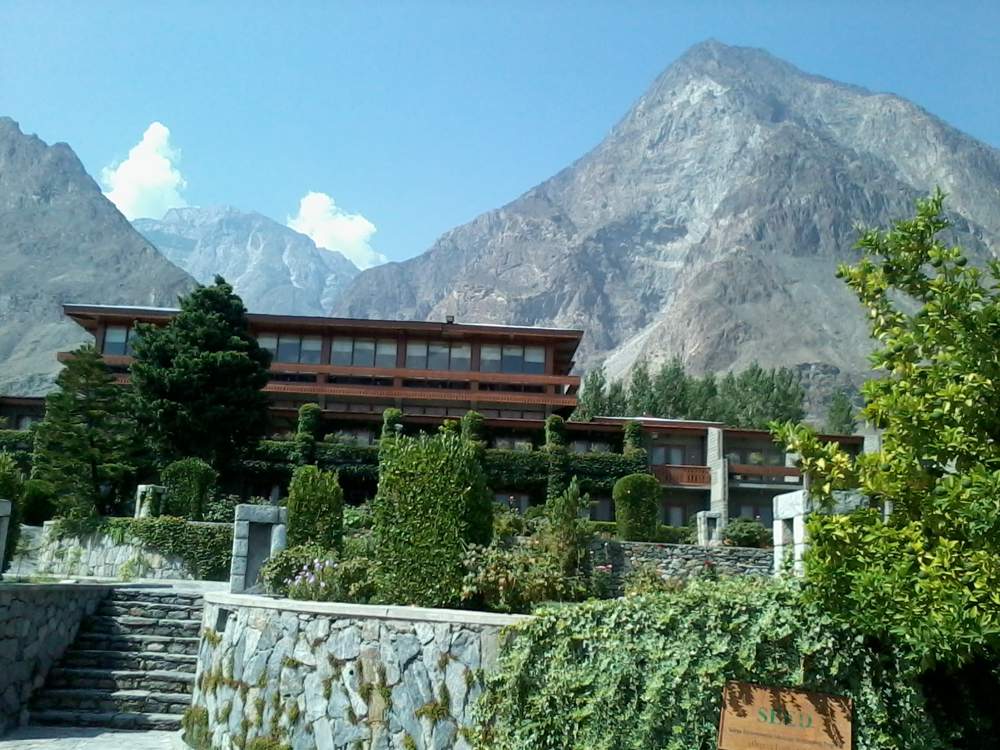
The hotel where I rest and recouperate
I send "A" home to his family, as Ramazan is ending. They have a holiday called Eid at the end of the fasting month, very
similar to Christmas, where they celebrate, and can once again eat in daylight. It is three days before I see "A" again,
and in that time I luxuriate in splendour, and recover after an interesting ordeal. That must have been one of the longest
days of my life.
Hey Dave, I found THE Bridge.
To Skardu
After THE Bridge episode I decided a small tour around would be nice. "A" hired a 4x4 and off we went. First up to
the Hunza Valley. My panorama failed a bit, bit I thought it was still beautiful for you.

The next two photos are among my favoutires.
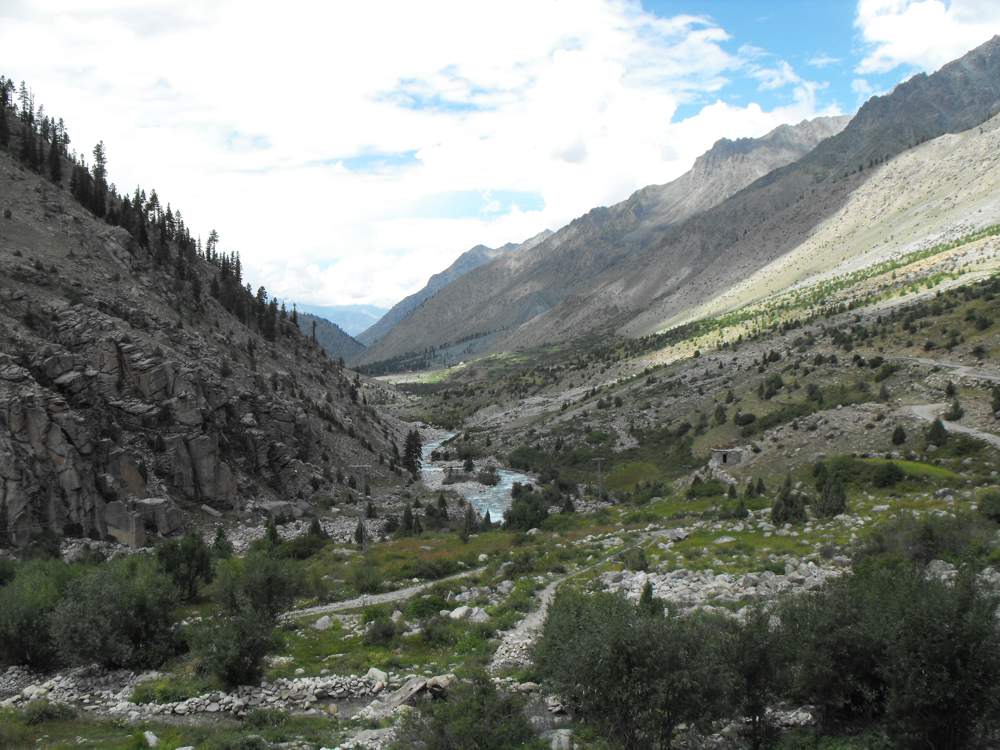
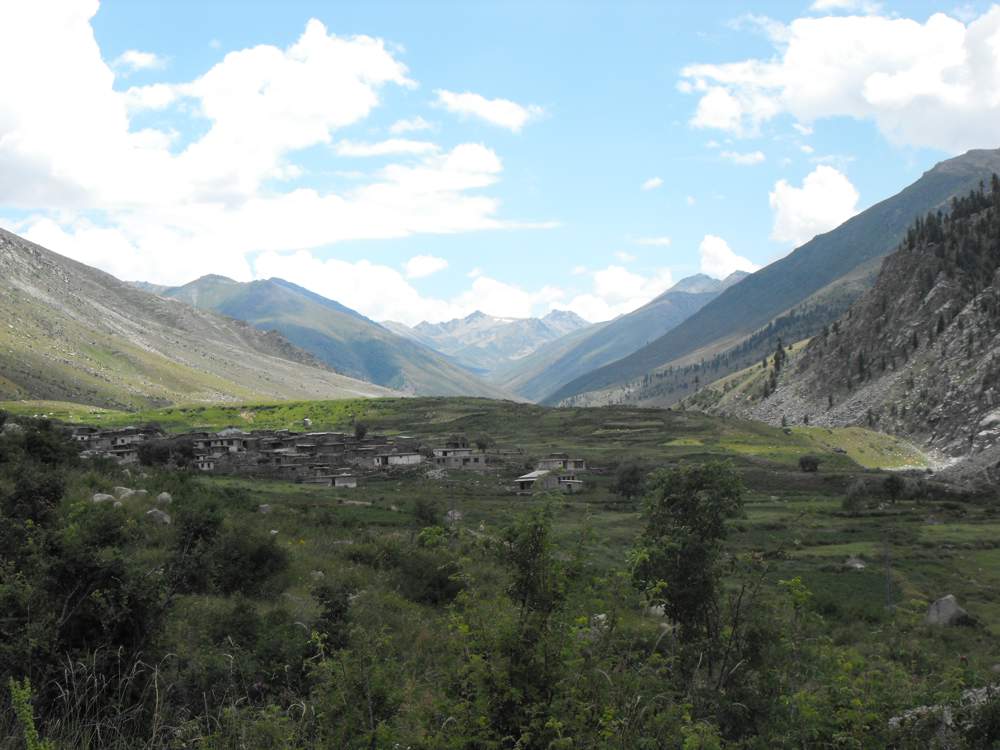
I wanted to go up to the Chinese border, but a huge landslide had happened in 2010 in the Gojal Valley,
cutting the KKH and creating the 20km long Attabad Lake and displacing 6,000 people. So we drove up to it and I took the
usual photos.
As you see they have installed a boat service, which takes you 25km up the lake, and then the KKH continues up to the
Chinese border.
We stayed a while to watch the boats, and then turned to return to Gilgit.
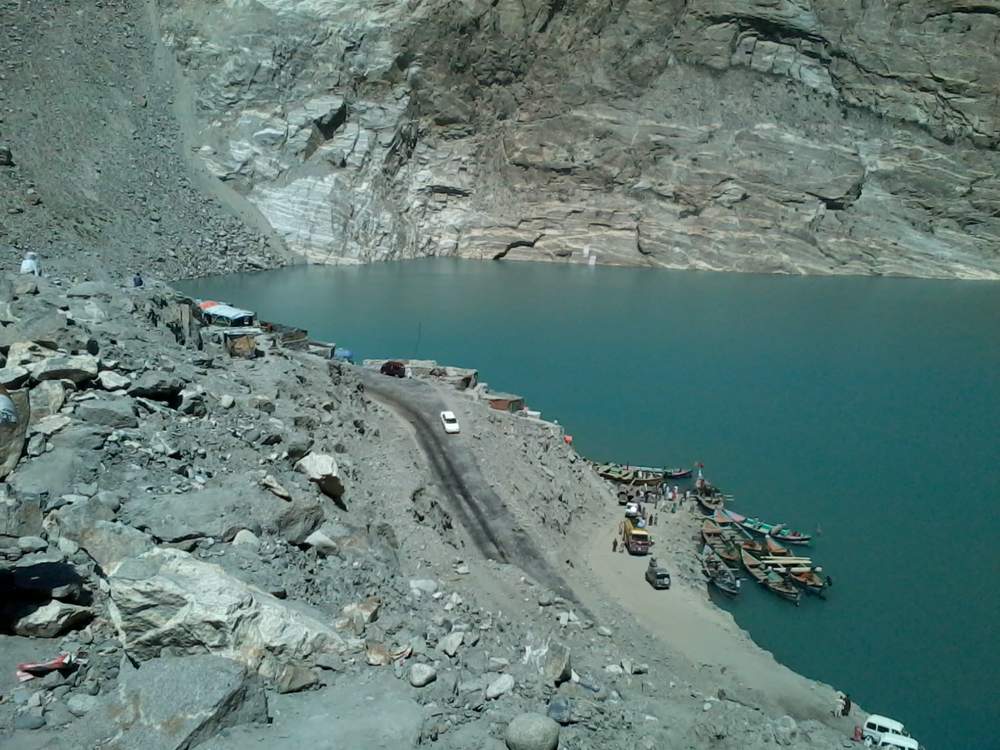
As we turned to drive back to Gilgit, "A" said we had no brakes.
Removing the rear left wheel showed brake fluid leaking. "A" borrowed some tools and made a temporary fix, by
blocking off the line to that wheel, and we limped back to Gilgit.
Once more was demonstrated how the Muslim sharing worked. In fact many people stopped to help, and the guy
who loaned the tools waited a long time to get them back.
I joked that it was my bad luck juju that was having an effect. A day later we had it fixed.
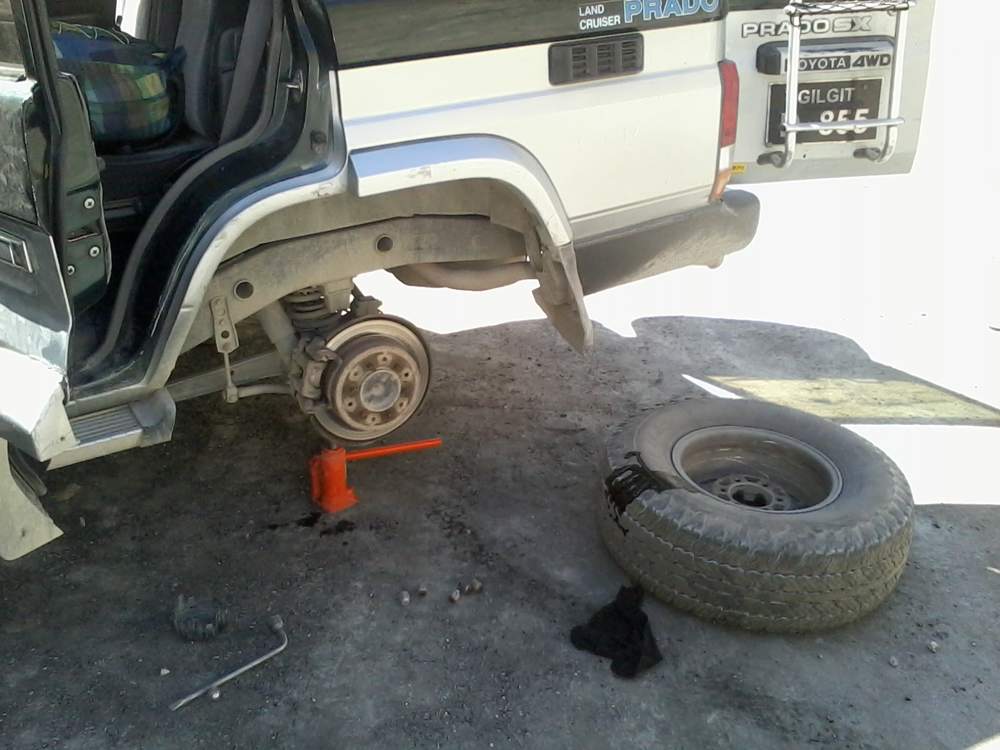
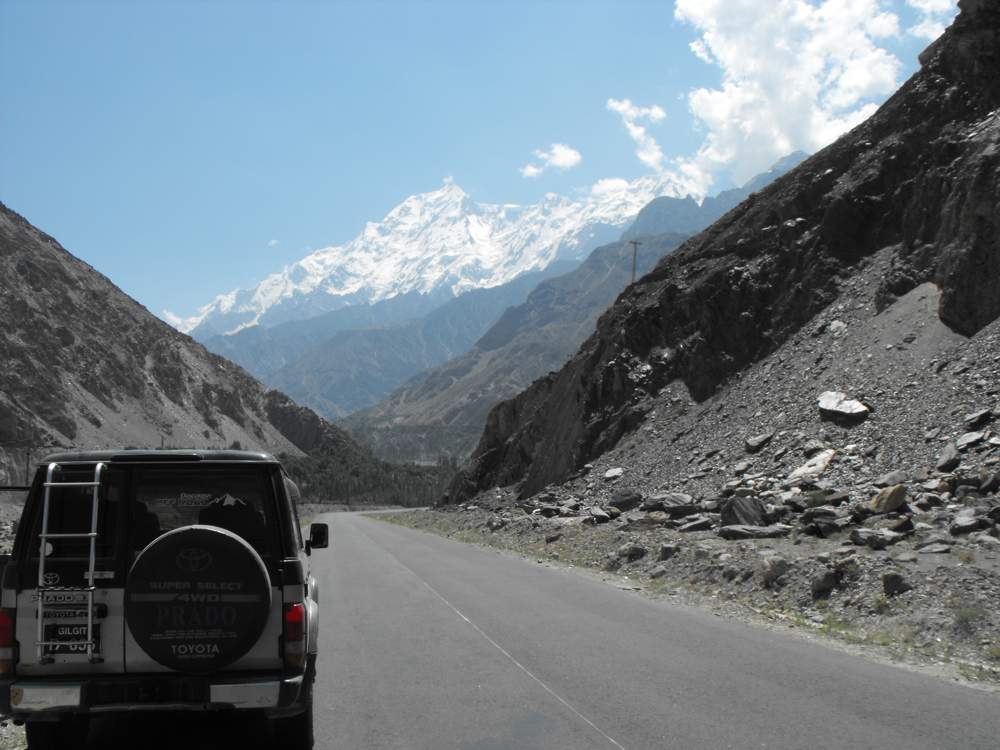
The Hunza valley is beautiful, and we passed a view of Mount Rakaposhi on the way.
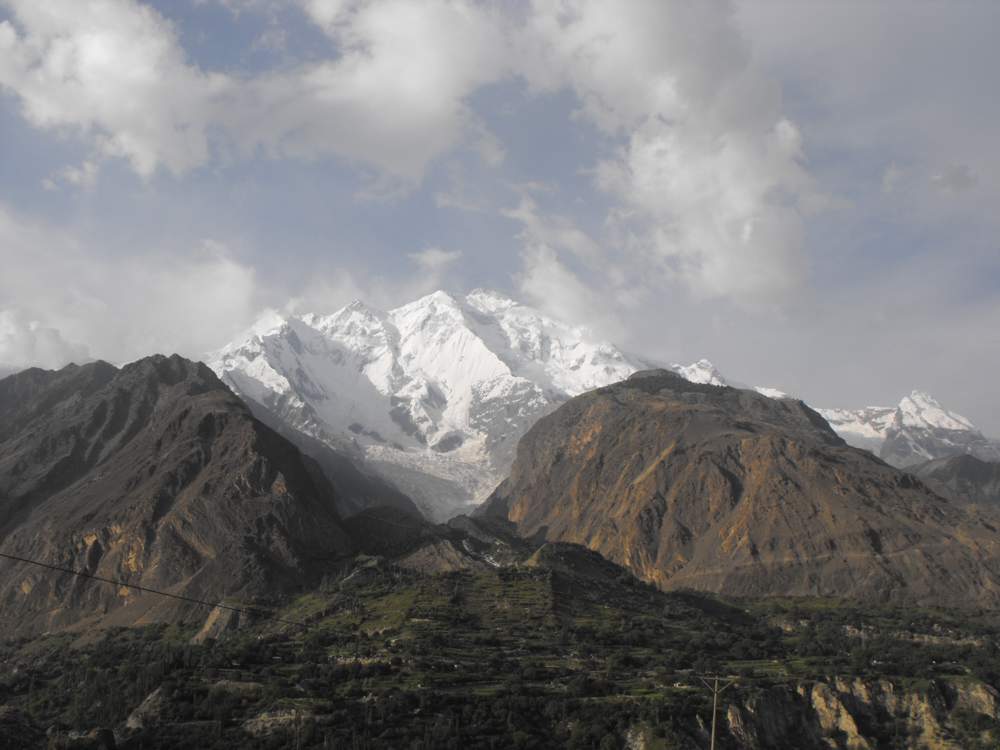
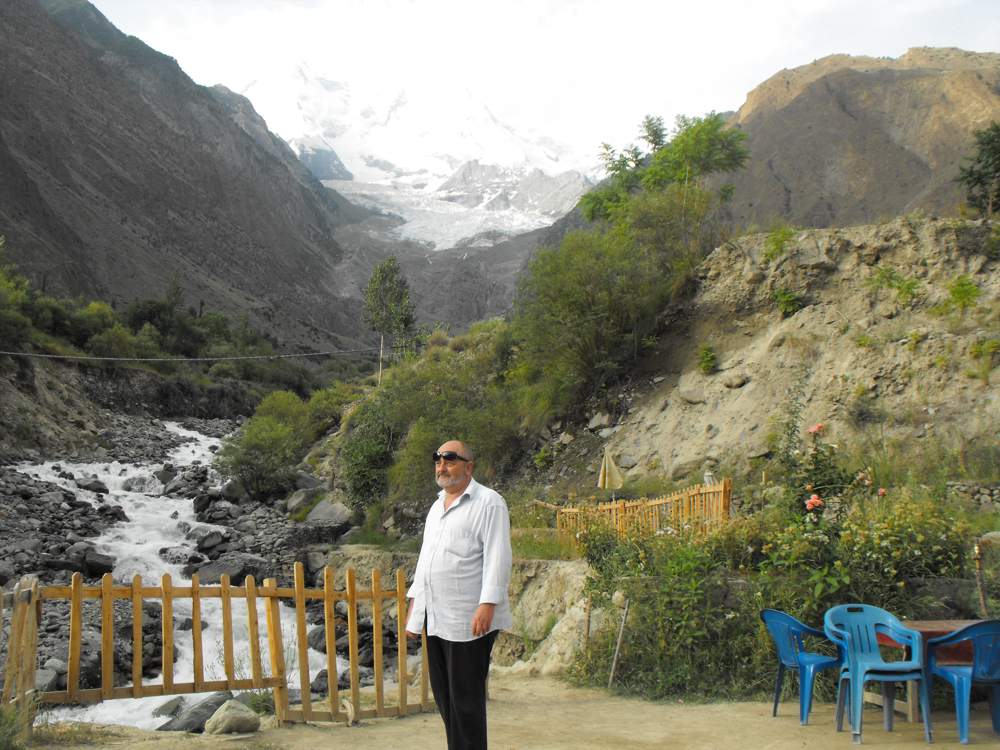
We headed back to Gilgit. It has some really old features. Until recently this bridge took motor traffic.
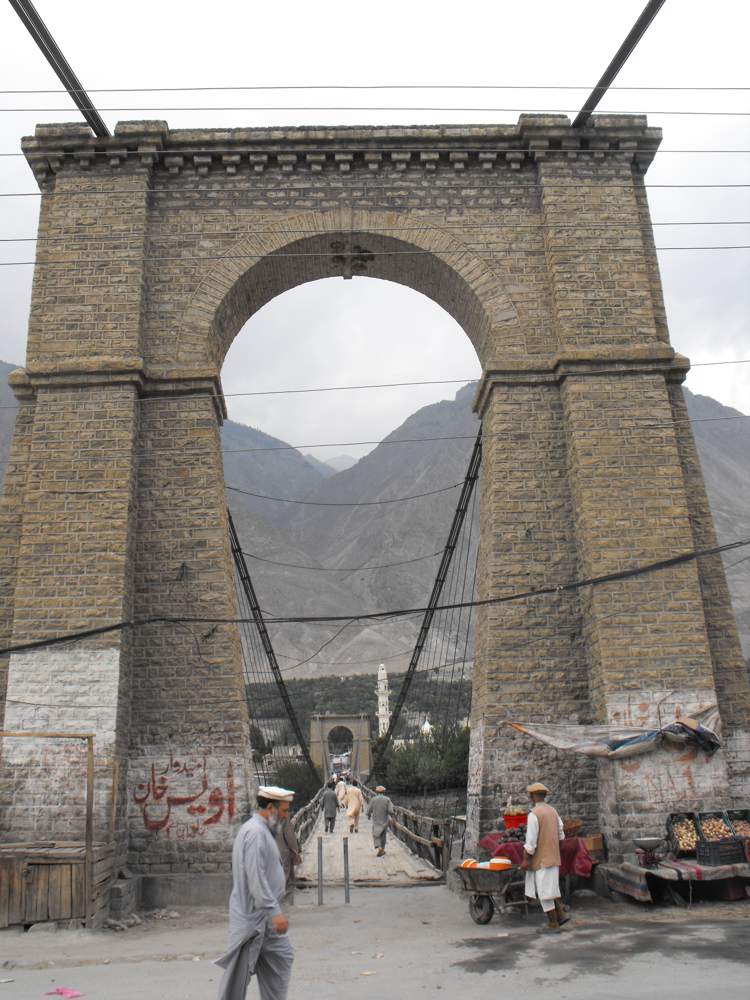
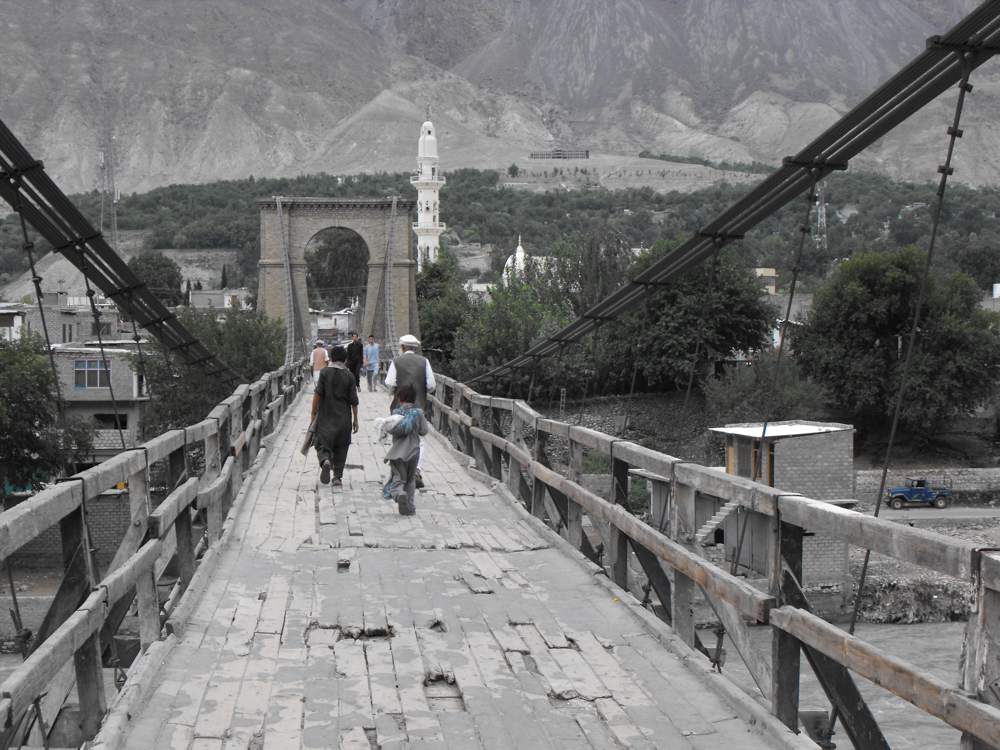
And this old footbridge also took human, cart and animal traffic. And the hotel over the river was spectacular.
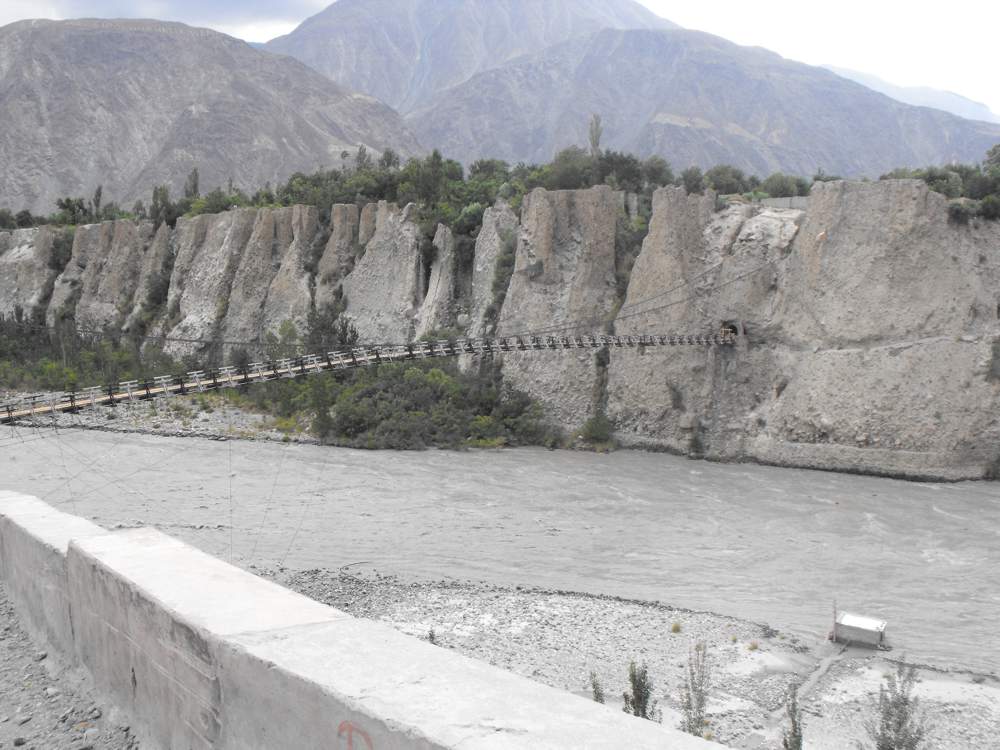
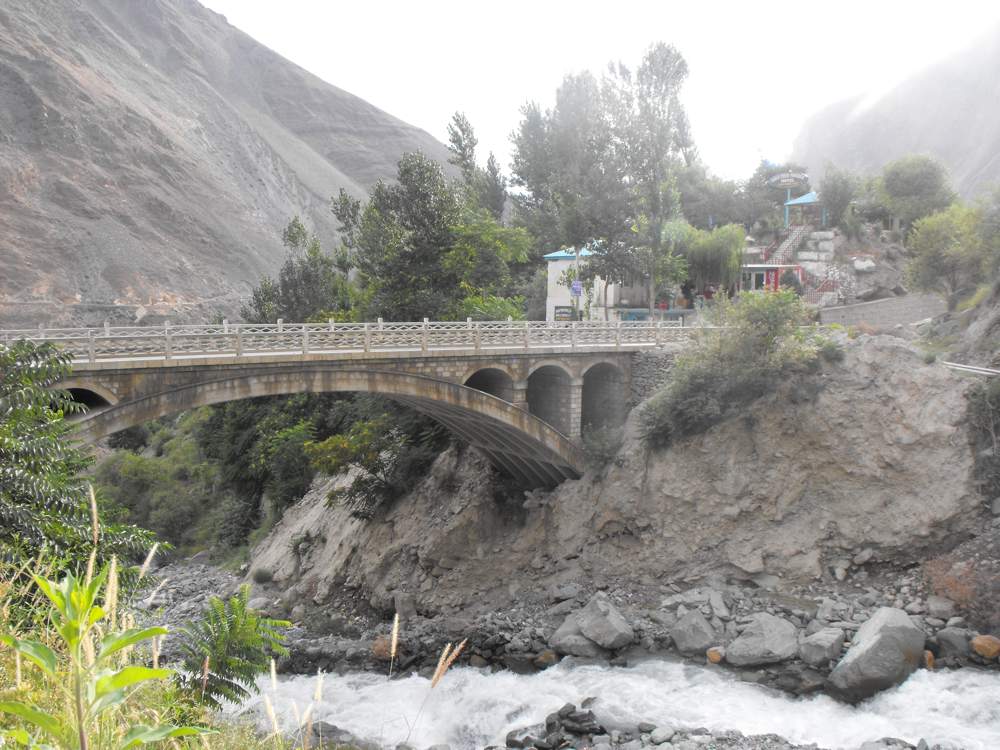
Wherever you go in northern Pakistan, there are trucks. And the owners adorn them to make them unique, many are works of art.
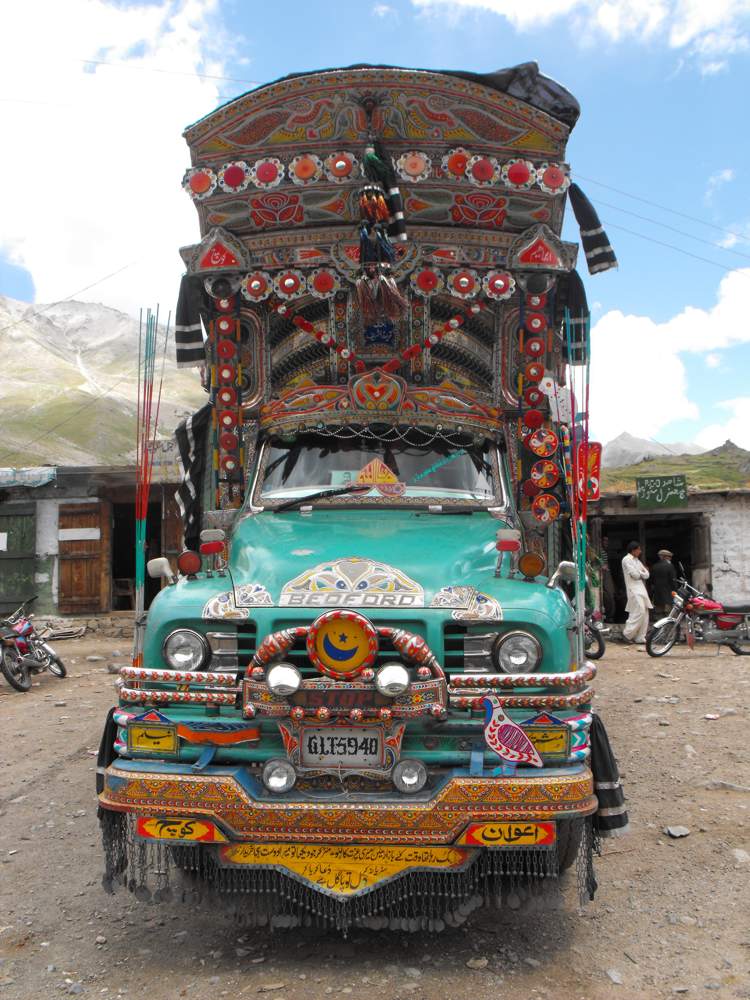
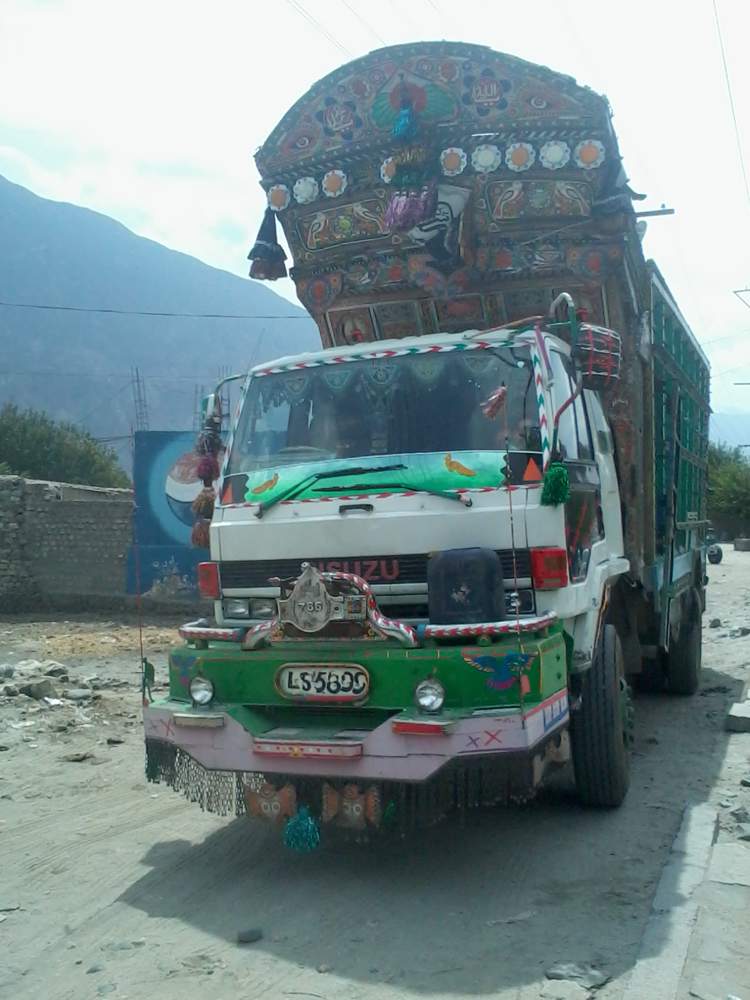
After the Hunza valley, we and set off in the other direction heading for Astore and the
Astore Valley. At Astore we had another police check at a barrier, only this time they were not pleased and took
us to the police station. Astore is 60km to the east of Nanga Parbat, and as the Taliban had murdered 10 mountaineers
at Nanga Parbat base camp the previous week, the police and military were on tenterhooks to protect foreigners.
So the police chief insisted we take with us a bodyguard, and allocated a corporal and a detective. They sat in
the back seats, and came everywhere we went, including coming up to Lake Rama with us.
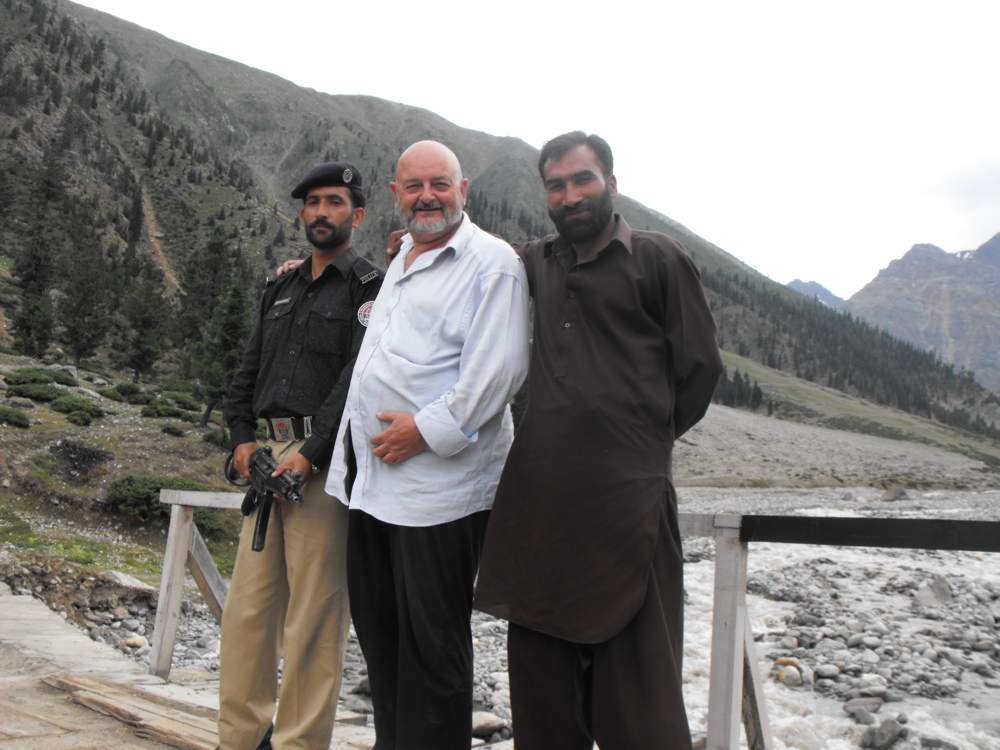
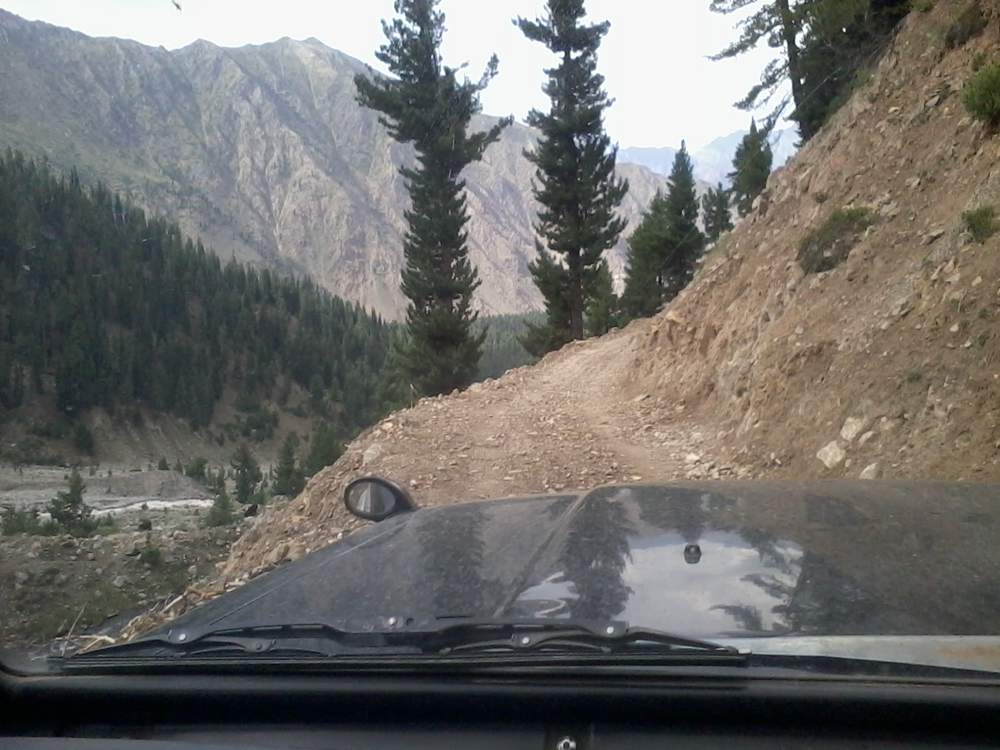
We visited Rama Lake, and on the way back stopped at the place "A"
had planned for us to camp in tents he had brought with us. This caused huge consternation with the police. I was
just falling asleep in my tent, when I was awoken by another police chief and his cohorts. They all squeezed into
the tent (as it was raining) to tell me to leave. We argued with them, and he left leaving behind three armed army
personnel to protect us in the night.
In the morning we still had out entourage following us everywhere. After a while I spat my dummy, and told "A" to
take us to Skardu the fastest way, as I was abandoning my trip. As we passed through Astore again, we were summoned
again to the police station. We were allotted a replacement policeman.
"A" was also getting tired of explaining who we (or really I) was, to every barrier policeman, so he wrote it out
on a piece of paper, and in Astore made ten photocopies of it. So each barrier we came to, he just gave them one
sheet. By then he had learned my passport number and visa number off by heart, not even I did that!
We got to a town called Chillum (yes that is correct), which was the end of the Astore police region. Our policeman
directed us to the police station, where we dropped him off, and were allotted another. This one was just a trainee
and had no gun. "A" suggested that the Skardu regional police were less worried, and were only giving him to us to
comply with senior orders.
The quickest way to Skardu was through the Deosai plateau. It is a wild desolate place, and the first time I had seen
plains and flat land since we got here. The mountains were seen in the distance. As we drove across, we came upon a
broken down truck, with about 15 people standing around, well Pushtuns actually. They wanted a lift. "A" argued with
them, as he had offered to take one of them with us to Skardu, and they were insisting we take three of them. As they
closed in around us, he gunned the engine and we drove off. I think we escaped an unknown but violent fate, as they
were not very pleased. Our trainee policeman looked very uncomfortable, he was just a teenager.
Views of Desoai, beautiful and desolate.

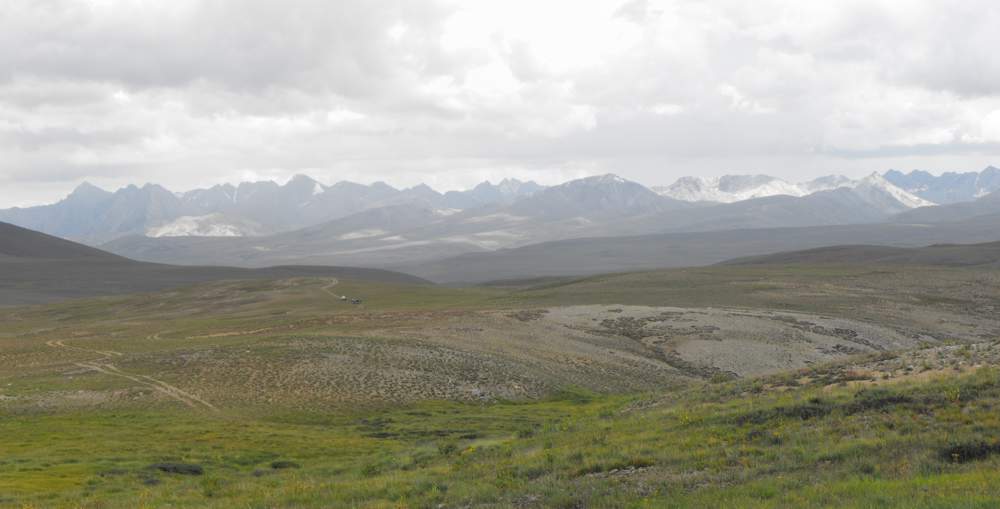
Finally as we dropped down from the Desoai plateau, we headed to Skardu.
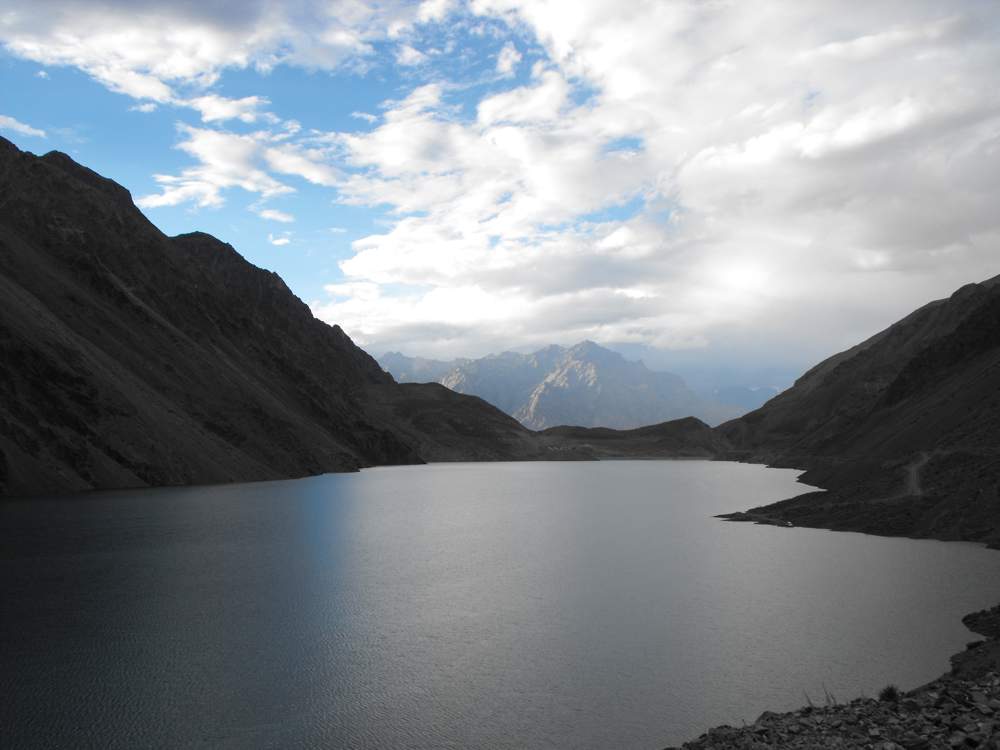
Six hours later we arrived in Skardu, and "A" found us a mid-range hotel. My plan was to fly from Skardu to Islamabad,
and then fly to Lahore and cross into India by foot at the Wagah border. We bought a ticket, but were told the flight
would depend on the weather. "A" left to take the 4x4 back to Gilgit, and I was alone for the first time since I arrived
in Pakistan. The flight was cancelled the next day, and the next, and every day for the following week.
Below is the view from my hotel room balcony.

Each morning as I awoke I looked out of my window to see the weather, and it was bleak. So I was trapped there.
The bus to Islamabad took the KKH back through Chilas, and Abbattobad and would take 24 hours. I seriously considered it,
but finally the weather cleared and flights began again.
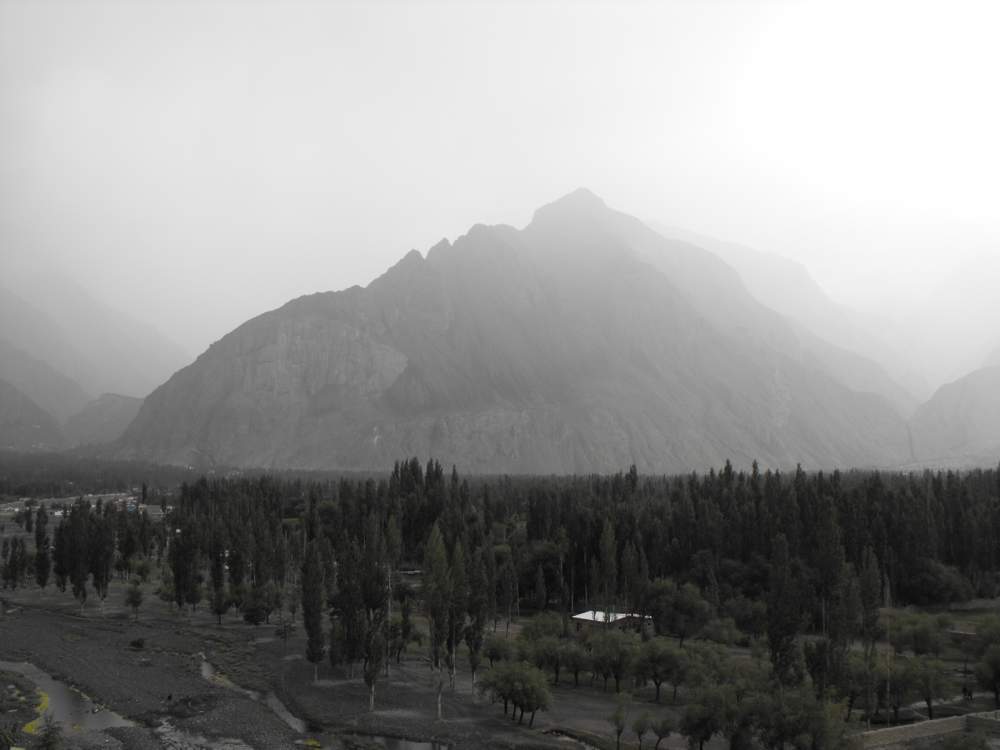
Finally the weather cleared, and I was on my way.
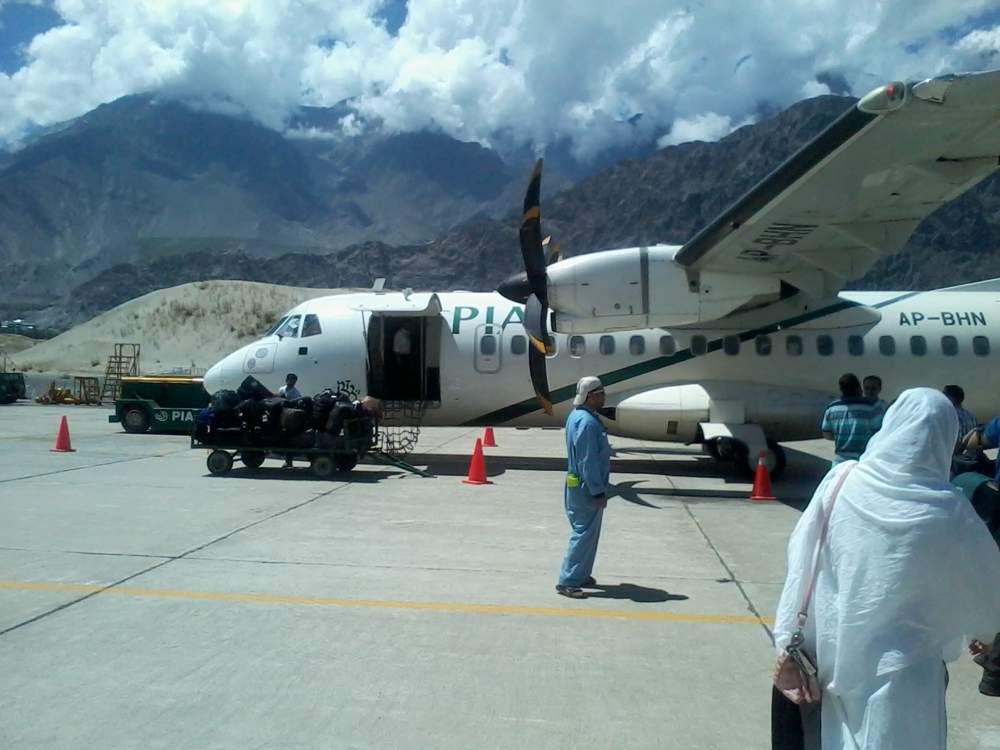
The flight to Islamabad from Skardu is 45 minutes. It is most unusual, as the cruising altitude is 12,000 feet and
all the mountains around us are higher than that, so the flight is down several valleys with the mountains directly
out of our windows. Passengers on the left would see Nanga Parbat. I was on the right side, but they reported they did
not see it as it was shrouded in cloud.
After we landed I took my second flight to Lahore, and a taxi from the airport to the border. So, six hours after I was
trapped in remote Skardu, I was about to cross the border into India. The Wagah border is famous for the pantomime closing
ceremony performed every day at 5pm, where the Pakistani and Indian army march up and down shouting mock insults at each
other. But apparently it is just for tourists, and is cancelled if there are too few.
Everywhere there are signs saying photography is prohibited, but I sneaked a shot. This is the view from the Pakistani side to the
Indian side. You can see the seats ready for the tourists, to watch the ceremony. When I was there it was cancelled.
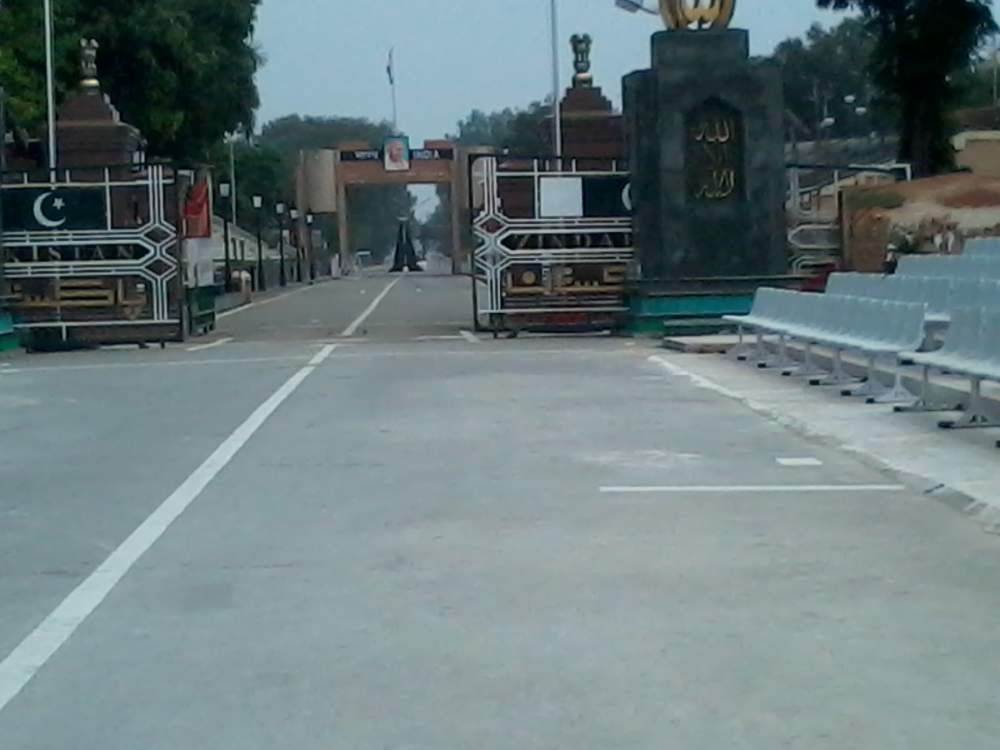
Well I was the only tourist to cross over. It took nearly four hours to transit out of Pakistan, walk over to India, and process into India.
There were customs, passport control and currency control on both sides, and they were all so bored that I provided
something for them to do,
so they were meticulous in every detail. As I walked through the Indian immigration hall, which was huge and empty, it echoed to
my footsteps.
A cab to Amritsar, and the next day I took a $3 nine hour train ride to Delhi, a very interesting experience. A flight
from Delhi via Singapore brought me home to Perth, where I sit now pondering my experiences in the sub-continent.
My heart goes out to all the people I met, to the unseen women hidden away, to the lusty young men denied simple courtship
with girls.
My anger goes out to the controlling elders of all creeds who manipulate youngsters into suicide attacks, and bend and
twist the teachings of a beautiful religion.
My sadness goes out to them all, as I realise there is nothing I can do to help them, except to be their friend.
I will continue to watch the Dawn Newspaper, and world news outlets to see if the situation in Pakistan ever changes,
so I may return one day to a free country and to travel and visit there without fear for myself and my friends, but I will
not hold my breath.
People:
Me, your author: Rik Favalli
Dave, my original travel buddy: Dave Brooks
"A", my guide and friend: whose name I am protecting for his safety
"M", our driver and the car owner: whose name I am protecting for his safety












































